Channels
Special Offers & Promotions
Asynt
Products
Contact Asynt
All articles from Asynt
Asynt launch sustainable benchtop synthesis tool for batch reactions from 50 mL to 500 mL
Sep 1, 2023
New LightSyn range from Asynt enabling critical temperature control in photochemistry tools
May 9, 2023
Innovative UK Sixth Form College breaks barriers between science in further education and in industry
Feb 21, 2023
Media Partners


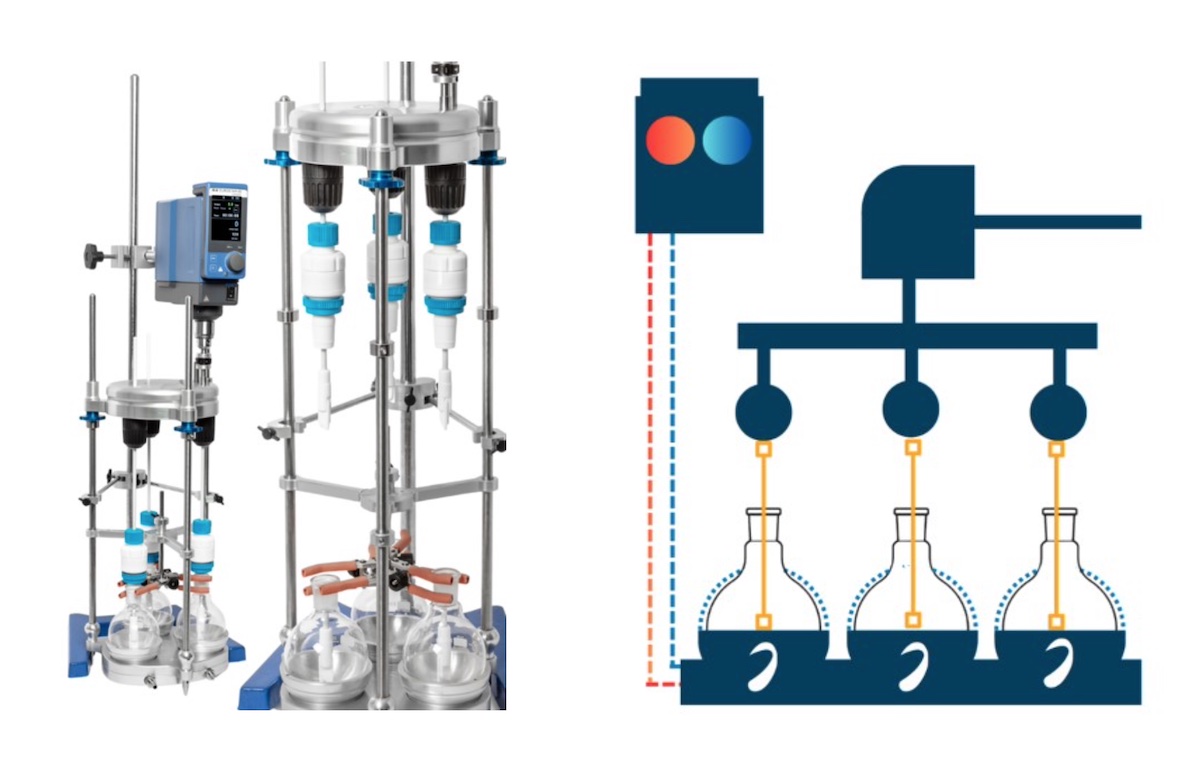 Triple your efficiency with one overhead stirrer and 3 temperature-controlled screening reactions. Asynt announce that lab-favourite, the DrySyn Vortex Parallel Overhead Stirring System is now available with active temperature control. Responding to customer demand, the new DrySyn Vortex Temperature Controlled System is engineered to provide active heating or cooling in parallel when attached to a suitable heater/cooler, thus maximising reaction conditions...
Triple your efficiency with one overhead stirrer and 3 temperature-controlled screening reactions. Asynt announce that lab-favourite, the DrySyn Vortex Parallel Overhead Stirring System is now available with active temperature control. Responding to customer demand, the new DrySyn Vortex Temperature Controlled System is engineered to provide active heating or cooling in parallel when attached to a suitable heater/cooler, thus maximising reaction conditions...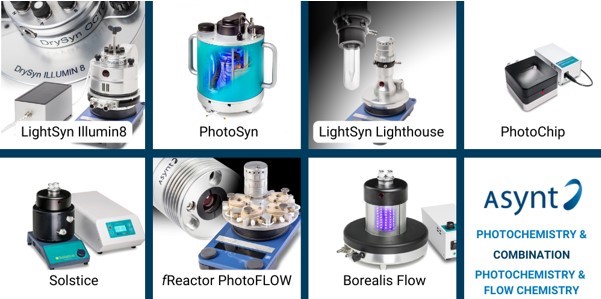 Laboratory specialist, Asynt, announces a new unique and extensive range of photochemistry reactors as part of their broad catalogue of both batch and flow equipment which enable flexible use for chemists over a wide range of applications and scales. Advancements in reactor technology in recent years has catalysed the rediscovery of ‘reagentless’ activation methods such as photochemistry, and the resulting new tools have changed the way researchers access photochemistry techniques and devise their synthetic routes and chemistries...
Laboratory specialist, Asynt, announces a new unique and extensive range of photochemistry reactors as part of their broad catalogue of both batch and flow equipment which enable flexible use for chemists over a wide range of applications and scales. Advancements in reactor technology in recent years has catalysed the rediscovery of ‘reagentless’ activation methods such as photochemistry, and the resulting new tools have changed the way researchers access photochemistry techniques and devise their synthetic routes and chemistries... Flow Chemistry specialist, Uniqsis, has been acquired by long-term trading partner - Asynt Ltd. The business deal, completed on 31st August 2024, includes the transfer of all Uniqsis staff, the company’s internationally respected intellectual property portfolio plus all equipment stock. Uniqsis’ renowned range of specialist Flow Chemistry products and accessories (including its FlowSyn, FlowLab and FlowLab Plus ranges) will continue to be sold and supported fully by Asynt...
Flow Chemistry specialist, Uniqsis, has been acquired by long-term trading partner - Asynt Ltd. The business deal, completed on 31st August 2024, includes the transfer of all Uniqsis staff, the company’s internationally respected intellectual property portfolio plus all equipment stock. Uniqsis’ renowned range of specialist Flow Chemistry products and accessories (including its FlowSyn, FlowLab and FlowLab Plus ranges) will continue to be sold and supported fully by Asynt...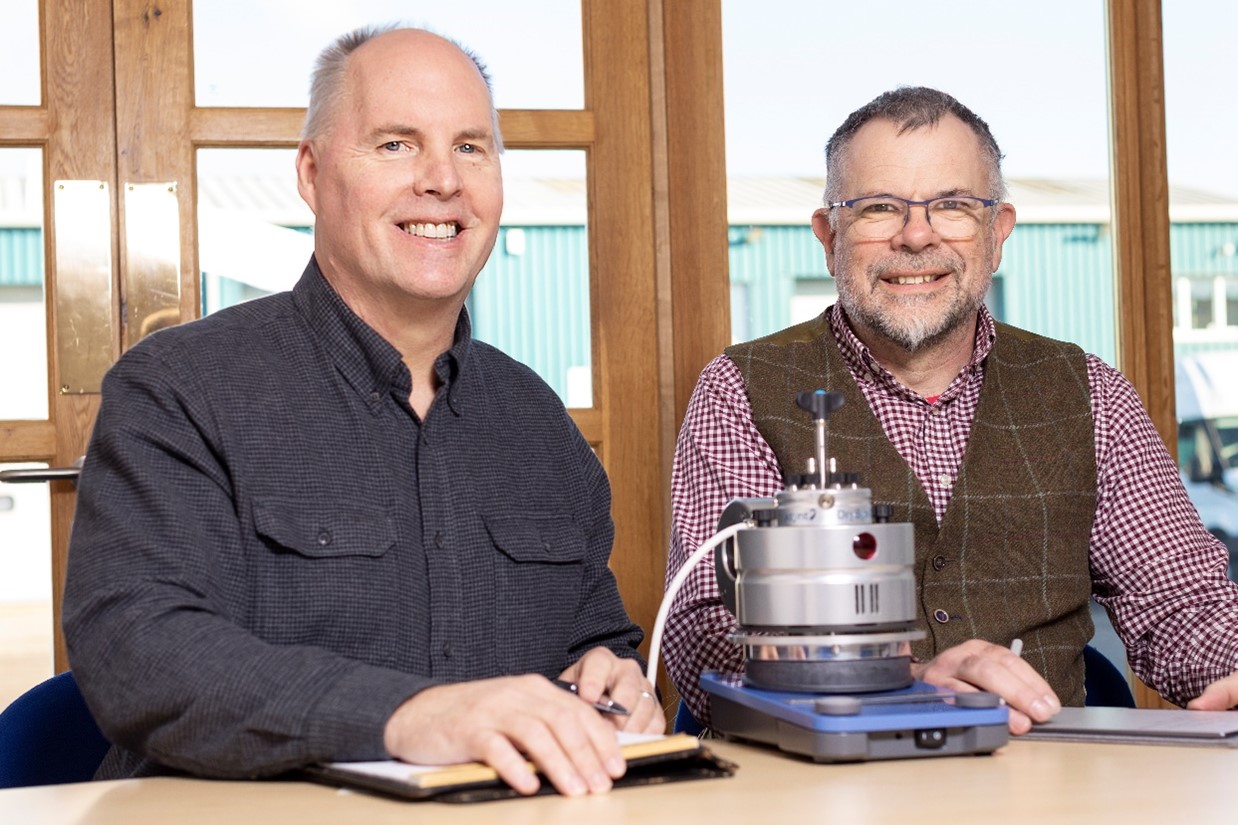 Asynt, a provider of innovative technologies and services for scientific research, is excited to announce the opening of its new office in the San Francisco Bay Area, California. This strategic move marks a significant step forward in Asynt's commitment to serving its North American clientele more effectively. The San Francisco Bay Area is an ideal location for Asynt's expansion due to its strategic geographical advantages...
Asynt, a provider of innovative technologies and services for scientific research, is excited to announce the opening of its new office in the San Francisco Bay Area, California. This strategic move marks a significant step forward in Asynt's commitment to serving its North American clientele more effectively. The San Francisco Bay Area is an ideal location for Asynt's expansion due to its strategic geographical advantages...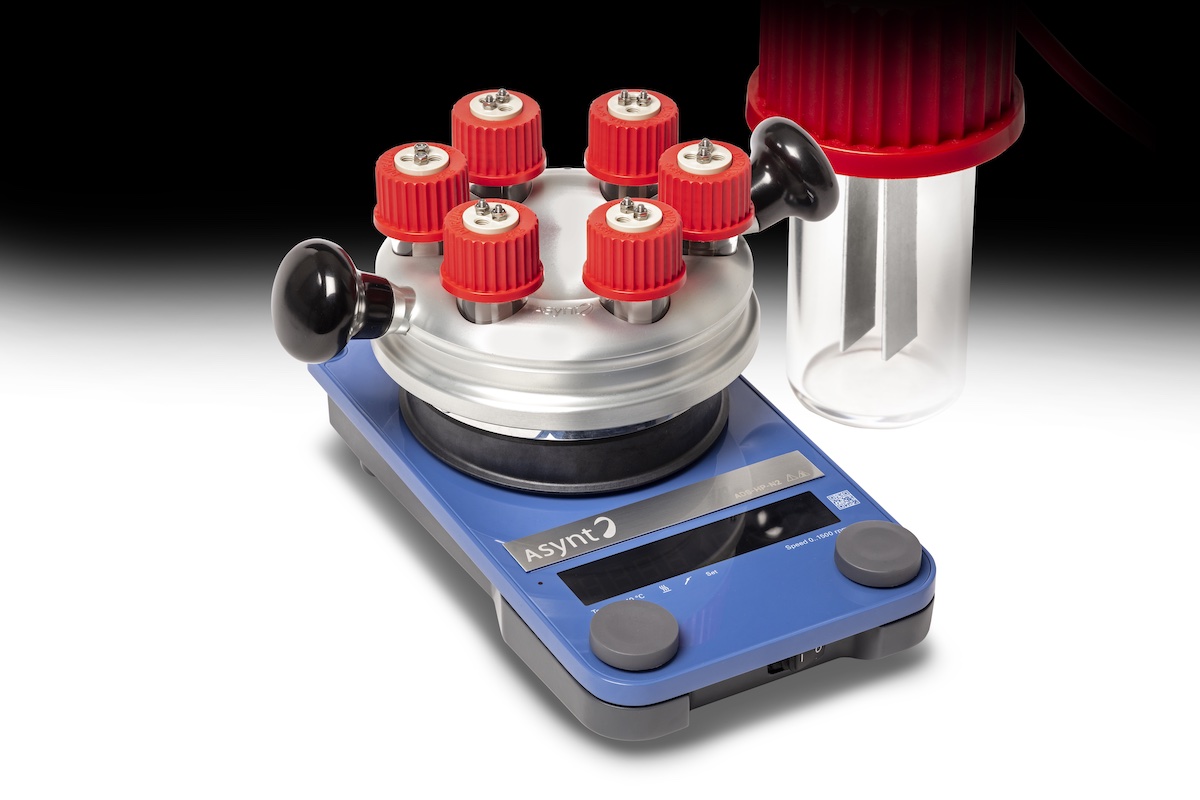 Asynt have announced the launch of an innovative electrochemistry platform, ElectroReact, to revolutionise how scientists carry out electrochemical reactions. Designed in conjunction with engineers and scientists at the University of Leeds, ElectroReact is built to enable truly flexible use and achieve repeatable and accurate results safely. With limited options previously available that offer complete flexibility, chemists often resorted to ‘homemade’ electrochemistry systems that can be potentially hazardous to use and make reproducing results...
Asynt have announced the launch of an innovative electrochemistry platform, ElectroReact, to revolutionise how scientists carry out electrochemical reactions. Designed in conjunction with engineers and scientists at the University of Leeds, ElectroReact is built to enable truly flexible use and achieve repeatable and accurate results safely. With limited options previously available that offer complete flexibility, chemists often resorted to ‘homemade’ electrochemistry systems that can be potentially hazardous to use and make reproducing results...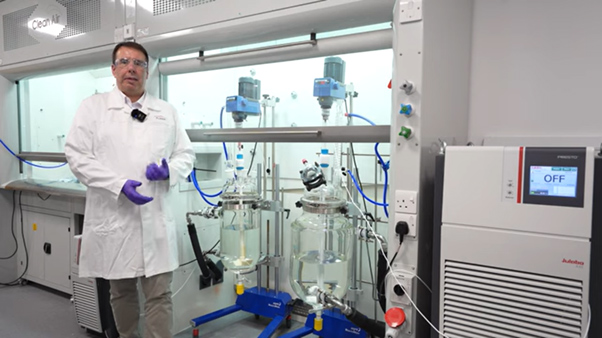 Asynt, a renowned provider of laboratory equipment, has collaborated with Almac Sciences, a leading specialist in API development and manufacturing, to design and supply a range of bespoke reactor vessels. This case study showcases the successful partnership between the two companies, highlighting the benefits of utilizing Asynt’s lab vessels to streamline Almac Sciences’ scale-up process...
Asynt, a renowned provider of laboratory equipment, has collaborated with Almac Sciences, a leading specialist in API development and manufacturing, to design and supply a range of bespoke reactor vessels. This case study showcases the successful partnership between the two companies, highlighting the benefits of utilizing Asynt’s lab vessels to streamline Almac Sciences’ scale-up process...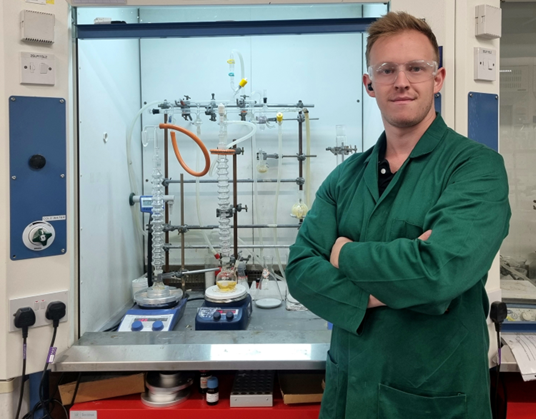 Global sustainable laboratory equipment visionaries, Asynt, have collaborated with Kingston University (London, UK) and renowned worldwide chemical products supplier, Key Organics, to develop an accessible new synthetic compound library. Chemists from the Wren Group at Kingston University (UK) have formed a collaborative relationship with these industry leaders, enabling them to create a novel synthetic compound library....
Global sustainable laboratory equipment visionaries, Asynt, have collaborated with Kingston University (London, UK) and renowned worldwide chemical products supplier, Key Organics, to develop an accessible new synthetic compound library. Chemists from the Wren Group at Kingston University (UK) have formed a collaborative relationship with these industry leaders, enabling them to create a novel synthetic compound library....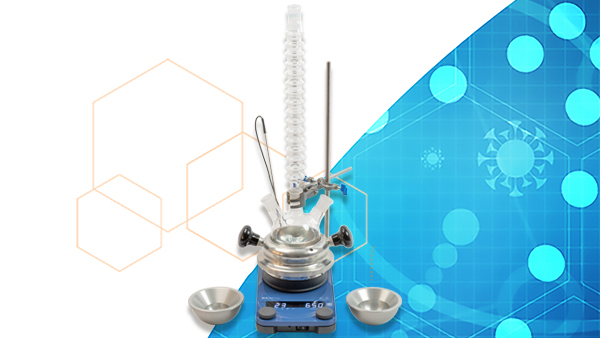 Renowned laboratory experts, Asynt, launch the NEW DrySyn Prodigy which offers oil-free heating of round bottom flasks up to 500 mL using fully recyclable materials. Ideal for synthetic chemistry research, the DrySyn Prodigy works seamlessly with any laboratory magnetic stirring hotplate with its unique adjustable and removable feet. It also comes with heat and chemical-resistant handles for optimum user-safety...
Renowned laboratory experts, Asynt, launch the NEW DrySyn Prodigy which offers oil-free heating of round bottom flasks up to 500 mL using fully recyclable materials. Ideal for synthetic chemistry research, the DrySyn Prodigy works seamlessly with any laboratory magnetic stirring hotplate with its unique adjustable and removable feet. It also comes with heat and chemical-resistant handles for optimum user-safety... Reactant concentrations can be easily monitored and adjusted by simply controlling the input/output flow rates into/out of the reactor, which gives chemists greater accuracy when carrying out complex reactions. The stirring of solutions within the reactor also ensures that reactants remain evenly mixed, resulting in consistent products across different batches. Furthermore, since reactions occur in real time with CSTRs, their residence times are much shorter compared to batch processing methods...
Reactant concentrations can be easily monitored and adjusted by simply controlling the input/output flow rates into/out of the reactor, which gives chemists greater accuracy when carrying out complex reactions. The stirring of solutions within the reactor also ensures that reactants remain evenly mixed, resulting in consistent products across different batches. Furthermore, since reactions occur in real time with CSTRs, their residence times are much shorter compared to batch processing methods...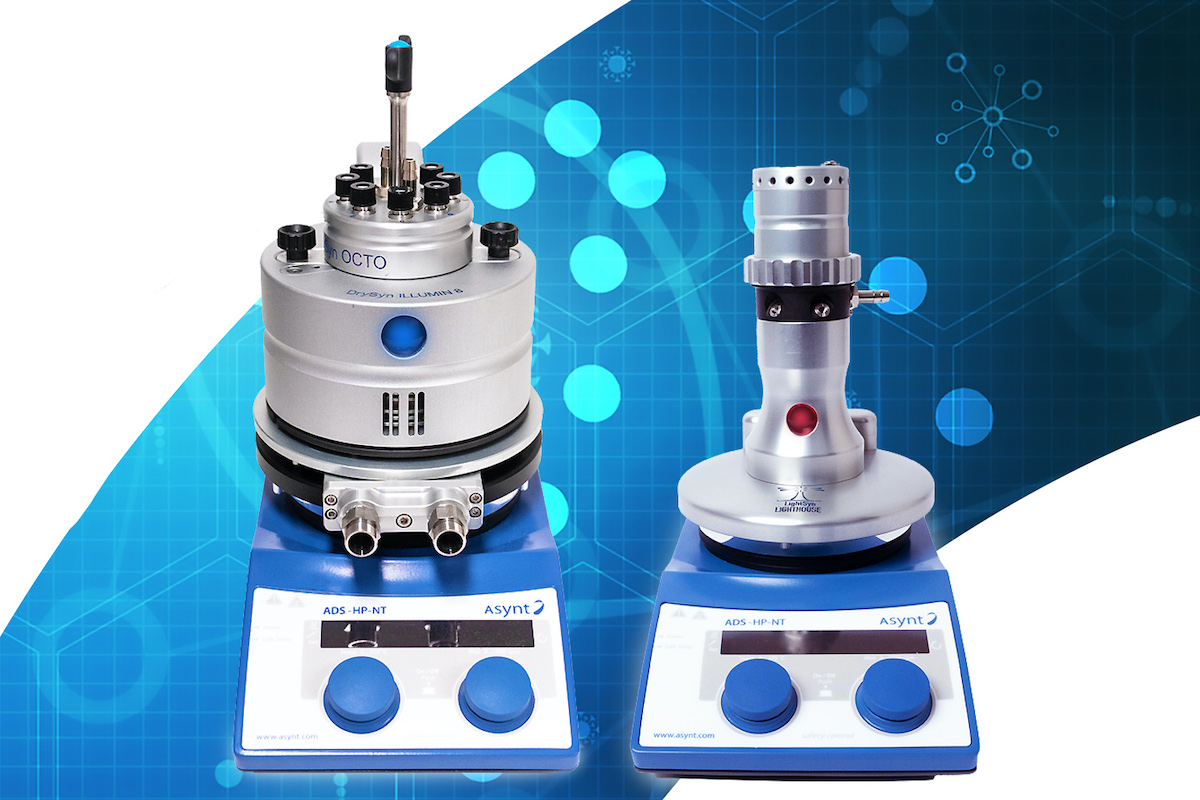 Asynt announces the expansion of it’s unique LightSyn photochemistry platform with a range of accessible heating and cooling temperature control solutions. With photoreactors designed to suit both batch photochemical reactions and parallel reactions in tubes/vials, global lab experts, Asynt, have launched complimentary bases for the platform which are suitable for both heating and cooling – providing optimum temperature control throughout the users’ reaction...
Asynt announces the expansion of it’s unique LightSyn photochemistry platform with a range of accessible heating and cooling temperature control solutions. With photoreactors designed to suit both batch photochemical reactions and parallel reactions in tubes/vials, global lab experts, Asynt, have launched complimentary bases for the platform which are suitable for both heating and cooling – providing optimum temperature control throughout the users’ reaction...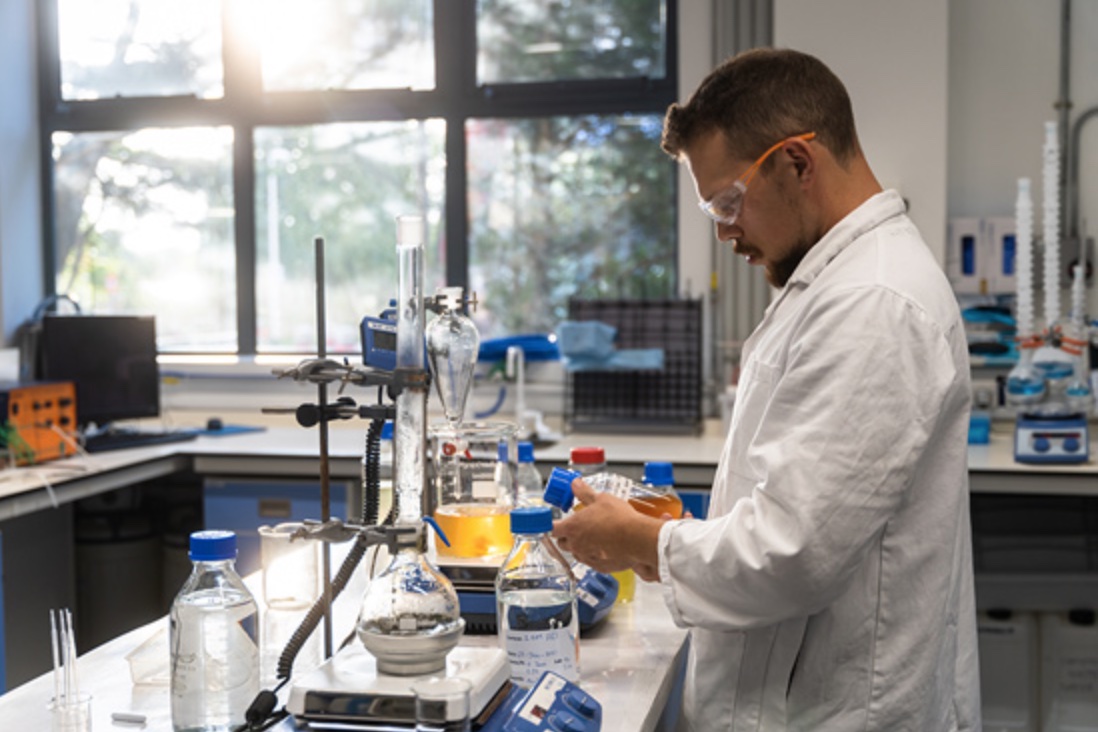 Sustainable material innovation company, Kelpi (Bristol, UK), is using Asynt’s DrySyn oil-free heating blocks and CondenSyn waterless air condensers in their fight against marine plastic pollution and single-use plastics manufactured from fossil fuels. Dr Stefanie Federle, Chief Scientific Officer, explained that “Kelpi is here to end the madness of using fossil fuels to create largely unrecycled, single-use packaging that takes hundreds of years to degrade, poisoning our oceans and polluting our landscape....
Sustainable material innovation company, Kelpi (Bristol, UK), is using Asynt’s DrySyn oil-free heating blocks and CondenSyn waterless air condensers in their fight against marine plastic pollution and single-use plastics manufactured from fossil fuels. Dr Stefanie Federle, Chief Scientific Officer, explained that “Kelpi is here to end the madness of using fossil fuels to create largely unrecycled, single-use packaging that takes hundreds of years to degrade, poisoning our oceans and polluting our landscape....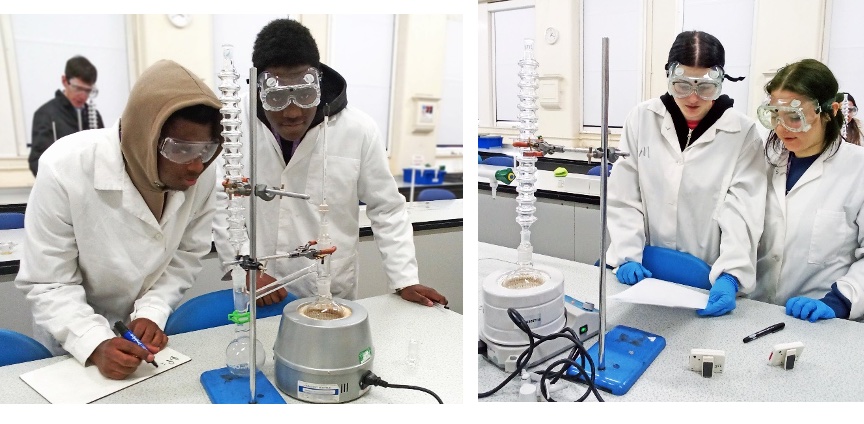 Asynt are proud to confirm that age 16+ learners attending Thomas Rotherham College (South Yorkshire, UK) Sixth Form College are using the CondenSyn waterless air condenser and Distillation Adapter in their lessons after recent updates in the science department. Luke Hanson, Lead Science Technician at the college, shared the college’s excitement at this change: ”We are proud to be one of the first pioneering sixth form colleges in the country to adopt the use of the CondenSyn in our teaching...
Asynt are proud to confirm that age 16+ learners attending Thomas Rotherham College (South Yorkshire, UK) Sixth Form College are using the CondenSyn waterless air condenser and Distillation Adapter in their lessons after recent updates in the science department. Luke Hanson, Lead Science Technician at the college, shared the college’s excitement at this change: ”We are proud to be one of the first pioneering sixth form colleges in the country to adopt the use of the CondenSyn in our teaching...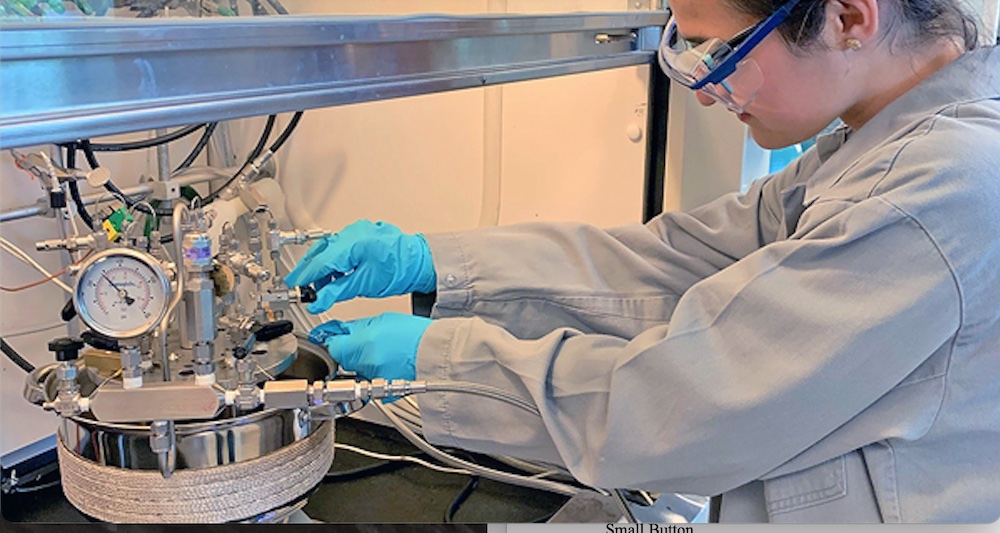 Chemists from the Chianese Group at Colgate University (NY, USA) have shared kinetic data obtained using the Asynt Multicell 10-position high pressure laboratory reactor in their recent paper, “The Key Role of the Latent N0H Group in Milstein’s Catalyst for Ester Hydrogenation”. Their characterisation of the mechanisms of Milstein’s catalysts has enabled greater understanding of the reactivity of these catalysts in ester hydrogenation...
Chemists from the Chianese Group at Colgate University (NY, USA) have shared kinetic data obtained using the Asynt Multicell 10-position high pressure laboratory reactor in their recent paper, “The Key Role of the Latent N0H Group in Milstein’s Catalyst for Ester Hydrogenation”. Their characterisation of the mechanisms of Milstein’s catalysts has enabled greater understanding of the reactivity of these catalysts in ester hydrogenation...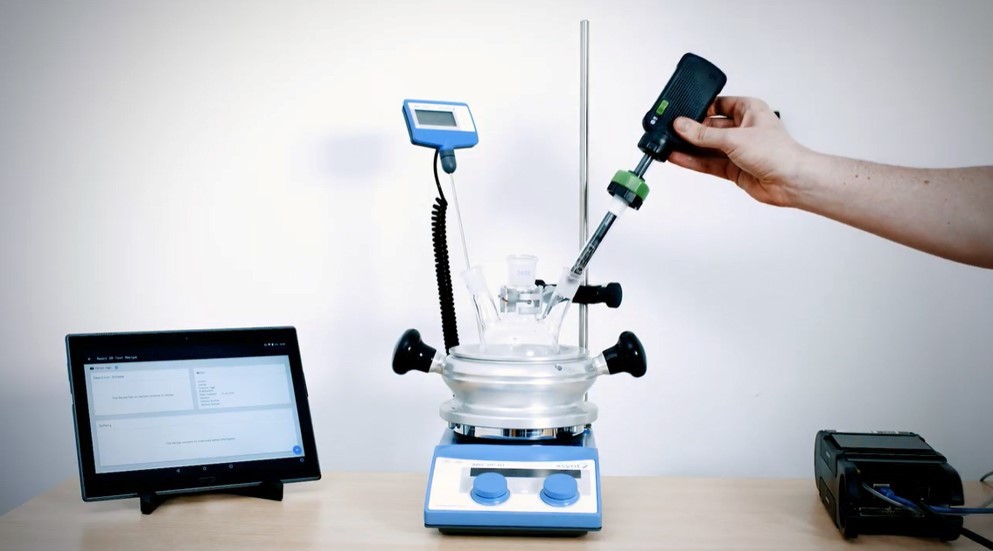 Asynt reports how the deepmatter® Group, with facilities in the UK, France and Germany, have developed the cloud-based SmartChemistry® platform to share chemical reaction and sensor data direct from the laboratory to allowing analysis of this information on an unprecedented scale. This single platform allows reaction data to be compiled from multiple data sources to provide...
Asynt reports how the deepmatter® Group, with facilities in the UK, France and Germany, have developed the cloud-based SmartChemistry® platform to share chemical reaction and sensor data direct from the laboratory to allowing analysis of this information on an unprecedented scale. This single platform allows reaction data to be compiled from multiple data sources to provide...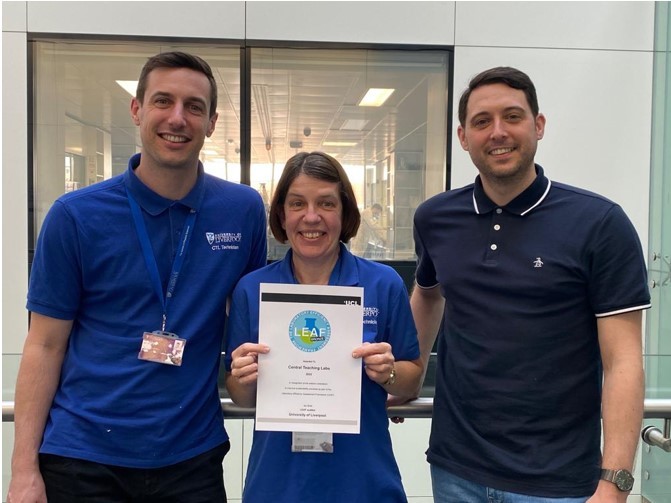 The Central Teaching Laboratories and the Department of Chemistry at the University of Liverpool (UK) has published an in-depth study that reports upon their implementation of Asynt laboratory equipment across multiple undergraduate teaching modules as they strive to meet their primary sustainability goals, reducing waste and to become net zero by 2035...
The Central Teaching Laboratories and the Department of Chemistry at the University of Liverpool (UK) has published an in-depth study that reports upon their implementation of Asynt laboratory equipment across multiple undergraduate teaching modules as they strive to meet their primary sustainability goals, reducing waste and to become net zero by 2035...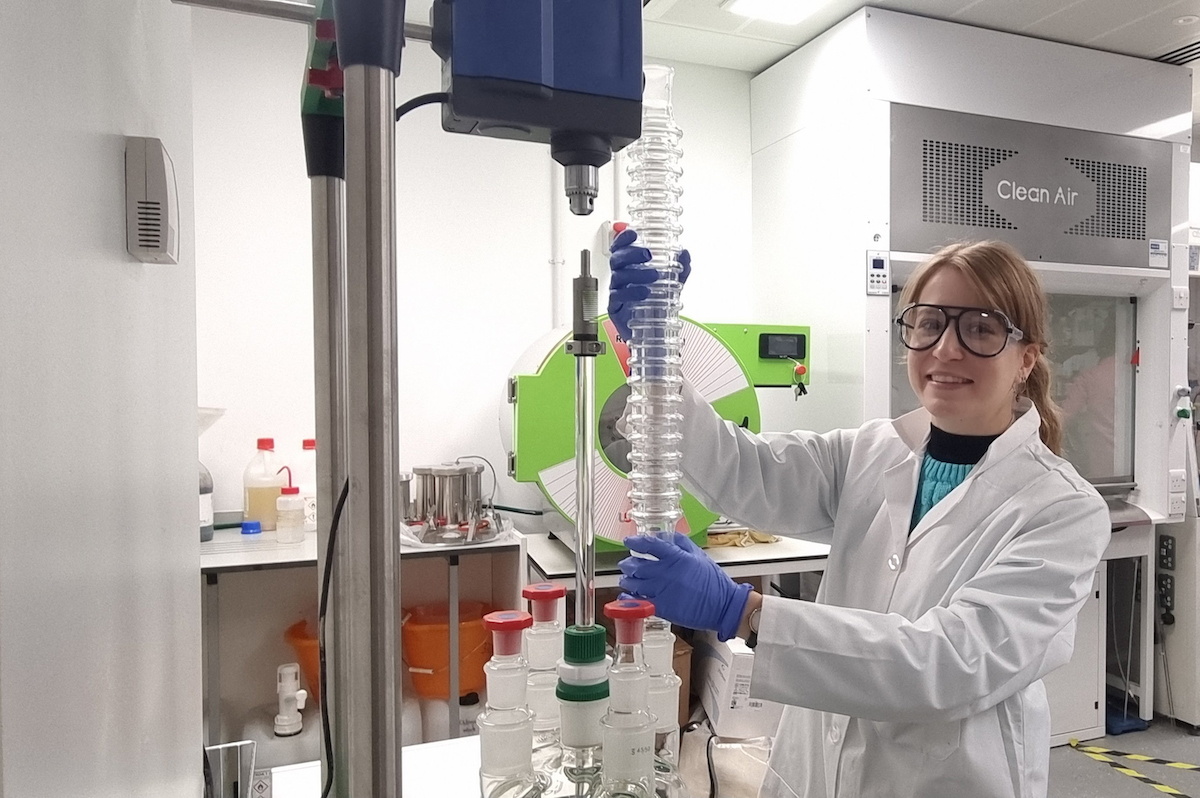 Perfect skin, clear conscience. Asynt reports how sustainable cosmetics innovator – Keracol Ltd (Leeds, UK) is using its DrySyn heating blocks and CondenSyn air condensers in the development and scale-up of their award-winning Dr Craft Mandarin green beauty product range. Keracol Ltd is a sustainable cosmetics spin-out company born from over 15 years of scientific research between Professor Chris Rayner and Professor Richard Blackburn of the University of Leeds, UK...
Perfect skin, clear conscience. Asynt reports how sustainable cosmetics innovator – Keracol Ltd (Leeds, UK) is using its DrySyn heating blocks and CondenSyn air condensers in the development and scale-up of their award-winning Dr Craft Mandarin green beauty product range. Keracol Ltd is a sustainable cosmetics spin-out company born from over 15 years of scientific research between Professor Chris Rayner and Professor Richard Blackburn of the University of Leeds, UK...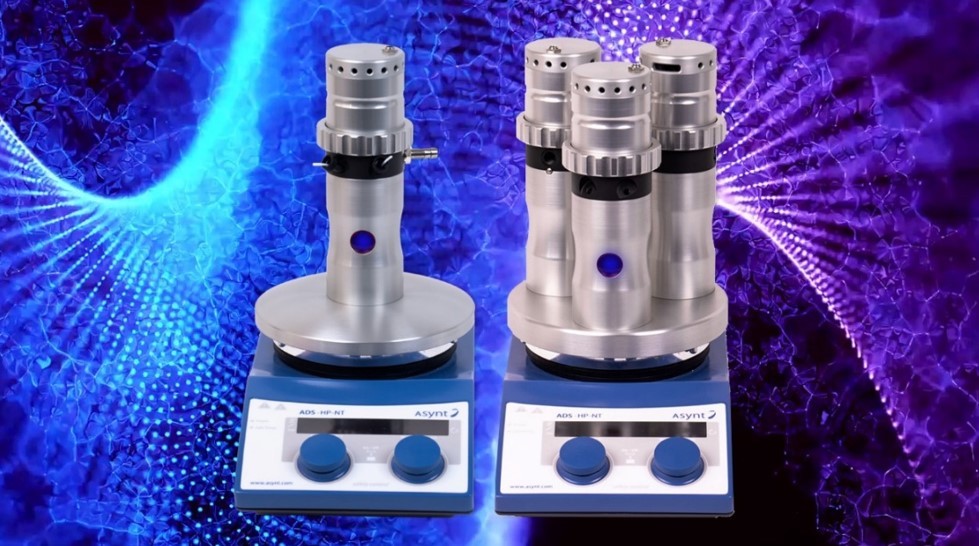 Asynt introduce the LightSyn Lighthouse – a new photochemical reactor system in their LightSyn range, developed in response to customer demand for higher reaction yields, ease of use, high operational safety, and competitive pricing. The LightSyn Lighthouse uses new technology to channel light through a quartz rod directly into the reaction medium, maximising power intensity while keeping photon flux even throughout....
Asynt introduce the LightSyn Lighthouse – a new photochemical reactor system in their LightSyn range, developed in response to customer demand for higher reaction yields, ease of use, high operational safety, and competitive pricing. The LightSyn Lighthouse uses new technology to channel light through a quartz rod directly into the reaction medium, maximising power intensity while keeping photon flux even throughout....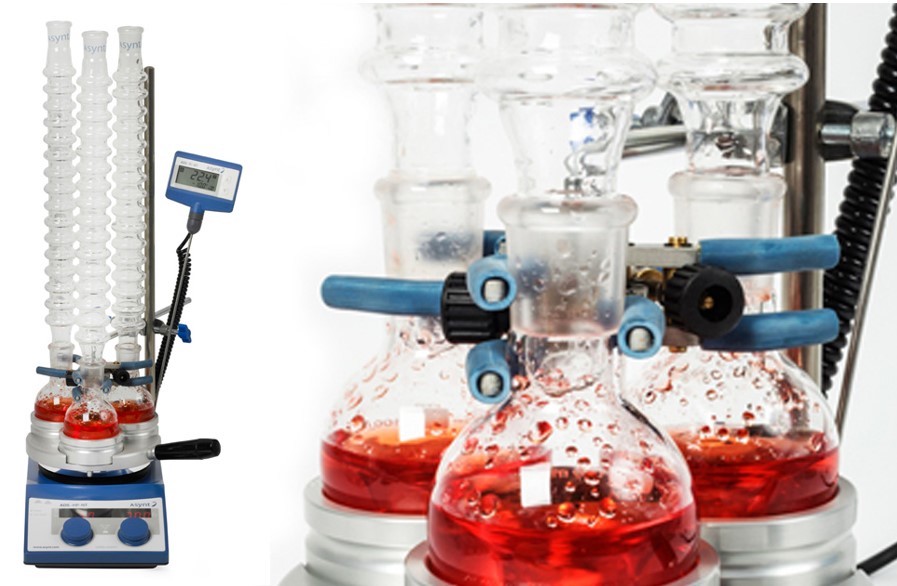 The CondenSyn waterless condenser from Asynt has been widely adopted by the Technicians Sustainability Working Group (TSWG) operating within the Biomolecular Science and Medicinal Chemistry Division at Nottingham University (UK) as part of their drive to make teaching and research greener. Lee Hibbett, a founder member of the TSWG, said "Water condensers have been used in our scientific labs for decades for refluxing reactions at elevated temperature and preventing evaporation of the solvent....
The CondenSyn waterless condenser from Asynt has been widely adopted by the Technicians Sustainability Working Group (TSWG) operating within the Biomolecular Science and Medicinal Chemistry Division at Nottingham University (UK) as part of their drive to make teaching and research greener. Lee Hibbett, a founder member of the TSWG, said "Water condensers have been used in our scientific labs for decades for refluxing reactions at elevated temperature and preventing evaporation of the solvent....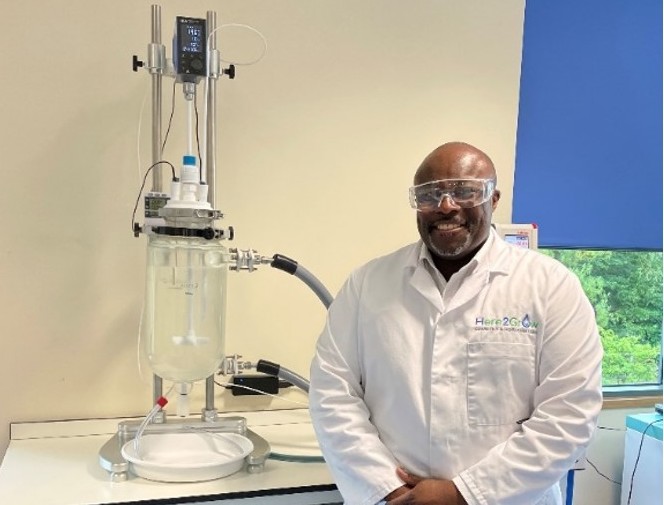 Asynt report how award-winning formulation and development lab – Here2Grow Cosmetics & Homecare Labs (Selby, UK) used the ReactoMate DATUM laboratory reaction vessel system in the development of a next generation clinical haircare product. To tackle common scalp issues encountered by patients, a tricology clinic had been developing scalp therapy products in collaboration with formulation laboratories and manufacturers....
Asynt report how award-winning formulation and development lab – Here2Grow Cosmetics & Homecare Labs (Selby, UK) used the ReactoMate DATUM laboratory reaction vessel system in the development of a next generation clinical haircare product. To tackle common scalp issues encountered by patients, a tricology clinic had been developing scalp therapy products in collaboration with formulation laboratories and manufacturers....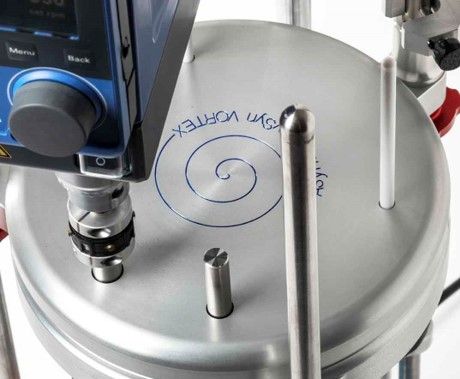 Incorporating an energy efficient drive mechanism – the compact DrySyn Vortex overhead stirrer system from Asynt delivers effective overhead stirring to three round bottom flasks (100 mL to 500 mL) in parallel with stirring from 50 to 500 rpm. Suitable for reaction temperatures up to 200°C, the DrySyn Vortex is the perfect process development tool to efficiently, and safely, drive three stirrer shafts with one overhead stirrer. The compact footprint of the DrySyn Vortex is designed to operate on a single standard hotplate...
Incorporating an energy efficient drive mechanism – the compact DrySyn Vortex overhead stirrer system from Asynt delivers effective overhead stirring to three round bottom flasks (100 mL to 500 mL) in parallel with stirring from 50 to 500 rpm. Suitable for reaction temperatures up to 200°C, the DrySyn Vortex is the perfect process development tool to efficiently, and safely, drive three stirrer shafts with one overhead stirrer. The compact footprint of the DrySyn Vortex is designed to operate on a single standard hotplate... Asynt report how Revive Eco (Glasgow, Scotland) are using their ReactoMate ATOM jacketed lab reactor and CondenSyn MAXI system to scale-up an innovative patent-pending process that allows them to strip out an oil from waste coffee grounds which has a very similar fatty acid profile to palm oil. Coffee is one of the most popular drinks worldwide with around two billion cups consumed every day...
Asynt report how Revive Eco (Glasgow, Scotland) are using their ReactoMate ATOM jacketed lab reactor and CondenSyn MAXI system to scale-up an innovative patent-pending process that allows them to strip out an oil from waste coffee grounds which has a very similar fatty acid profile to palm oil. Coffee is one of the most popular drinks worldwide with around two billion cups consumed every day...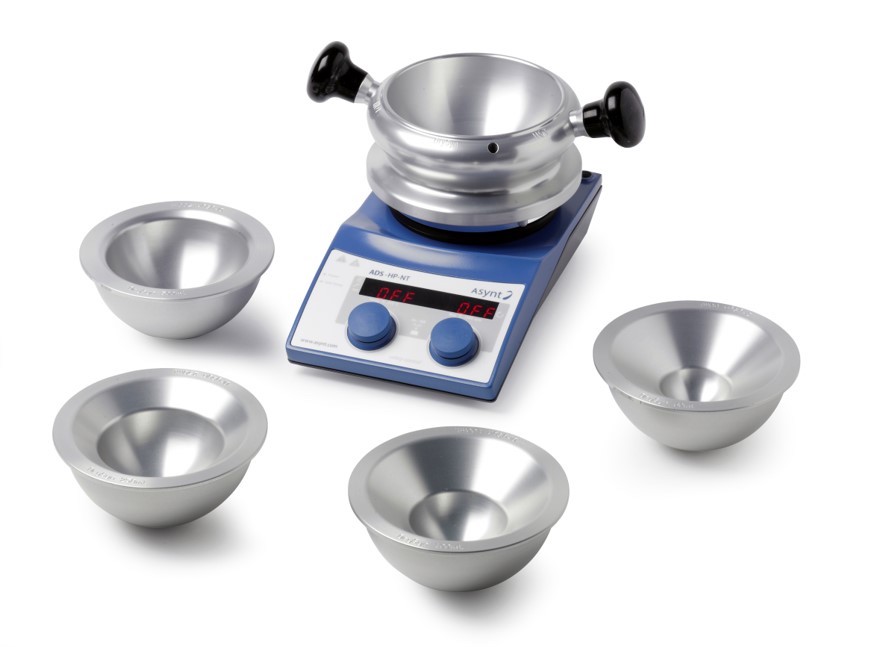 Designed to enable clean, safe synthesis – the DrySyn Classic Starter kit from Asynt is an attractively priced package for labs looking to undertake heated reactions in the most commonly-used round bottomed flasks (50, 100, 250, 500 and 1000ml). This versatile starter kit also includes heat resistant handles which enable fast, simple, and safe lifting of your heated reaction flask...
Designed to enable clean, safe synthesis – the DrySyn Classic Starter kit from Asynt is an attractively priced package for labs looking to undertake heated reactions in the most commonly-used round bottomed flasks (50, 100, 250, 500 and 1000ml). This versatile starter kit also includes heat resistant handles which enable fast, simple, and safe lifting of your heated reaction flask...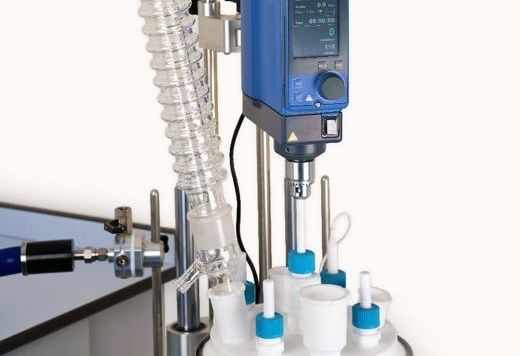 Developed in response to customer demand, the new CondenSyn MAXI from Asynt is ideal for larger scale synthetic chemical reactions and is the latest addition to their popular laboratory air condenser range which is proven in tens of thousands of installations worldwide. The CondenSyn MAXI enables scientists to scale up their experiments effectively from small benchtop synthesis to large volume jacketed reactor vessels...
Developed in response to customer demand, the new CondenSyn MAXI from Asynt is ideal for larger scale synthetic chemical reactions and is the latest addition to their popular laboratory air condenser range which is proven in tens of thousands of installations worldwide. The CondenSyn MAXI enables scientists to scale up their experiments effectively from small benchtop synthesis to large volume jacketed reactor vessels...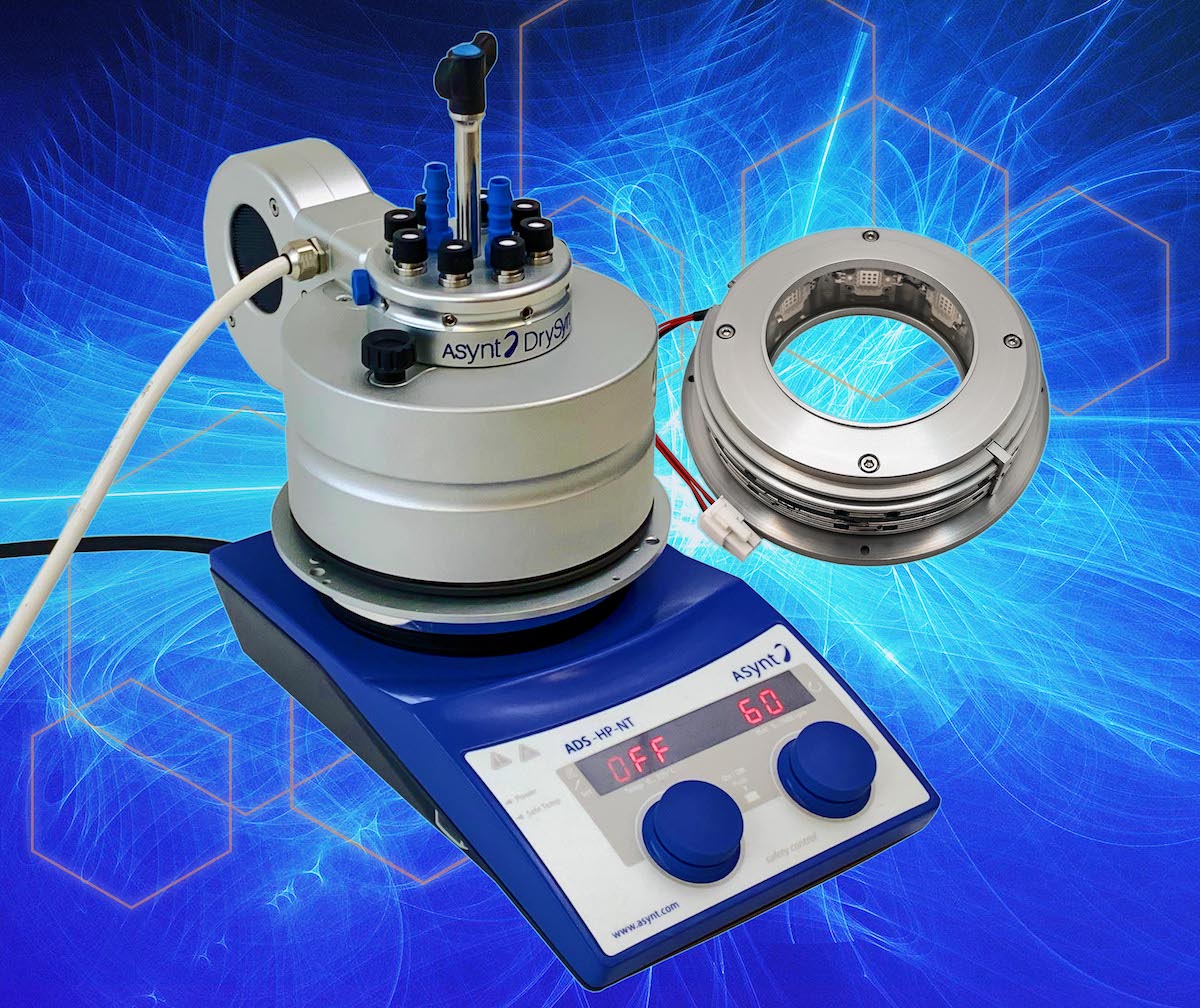 The LightSyn Illumin8 photoreactor from Asynt offers researchers the flexibility to change quickly and safely between a selection of high-power light emitting diodes (LEDs) operating at wavelengths including UV (365 nm) and blue (450 nm). The LightSyn Illumin8 allows chemists to run up to 8 photochemical reactions in parallel using low-cost 8 mL tubes. Compact in size, this affordable yet high performance photoreactor offers up to eight interchangeable modules of eight UV or coloured LEDs...
The LightSyn Illumin8 photoreactor from Asynt offers researchers the flexibility to change quickly and safely between a selection of high-power light emitting diodes (LEDs) operating at wavelengths including UV (365 nm) and blue (450 nm). The LightSyn Illumin8 allows chemists to run up to 8 photochemical reactions in parallel using low-cost 8 mL tubes. Compact in size, this affordable yet high performance photoreactor offers up to eight interchangeable modules of eight UV or coloured LEDs...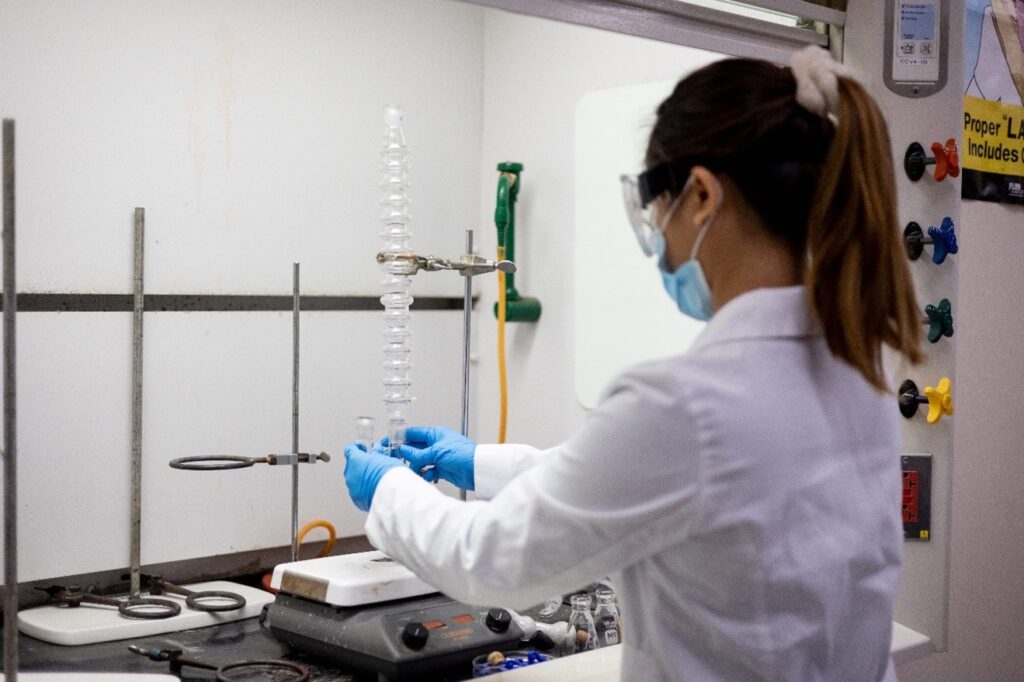 Asynt reports how the implementation of CondenSyn waterless air condensers throughout the teaching labs at the Department of Chemistry at the College of the Sequoias (Visalia, CA) is benefitting the wider community whilst providing outstanding performance for their students. Due to ongoing water shortages, California water officials recently had no alternative but to impose new drought rules throughout the state to discourage wasteful water practices...
Asynt reports how the implementation of CondenSyn waterless air condensers throughout the teaching labs at the Department of Chemistry at the College of the Sequoias (Visalia, CA) is benefitting the wider community whilst providing outstanding performance for their students. Due to ongoing water shortages, California water officials recently had no alternative but to impose new drought rules throughout the state to discourage wasteful water practices...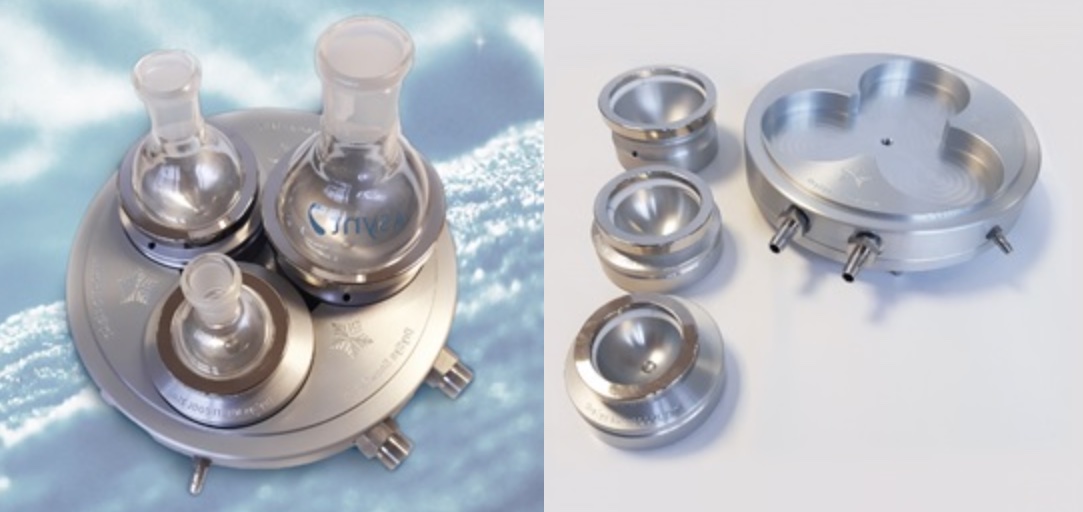 Optimised for low temperature chemistry - the DrySyn SnowStorm MULTI Starter Kit from Asynt enables users to perform parallel reactions from ambient to -30 ?C – all within a compact footprint. The ability to cool and stir up to 3 round bottom flasks (25 mL, 50 mL, or 100 mL) in parallel, and to hold constant sub-ambient temperatures for long periods of time, makes the DrySyn SnowStorm MULTI Starter Kit a highly attractive tool...
Optimised for low temperature chemistry - the DrySyn SnowStorm MULTI Starter Kit from Asynt enables users to perform parallel reactions from ambient to -30 ?C – all within a compact footprint. The ability to cool and stir up to 3 round bottom flasks (25 mL, 50 mL, or 100 mL) in parallel, and to hold constant sub-ambient temperatures for long periods of time, makes the DrySyn SnowStorm MULTI Starter Kit a highly attractive tool...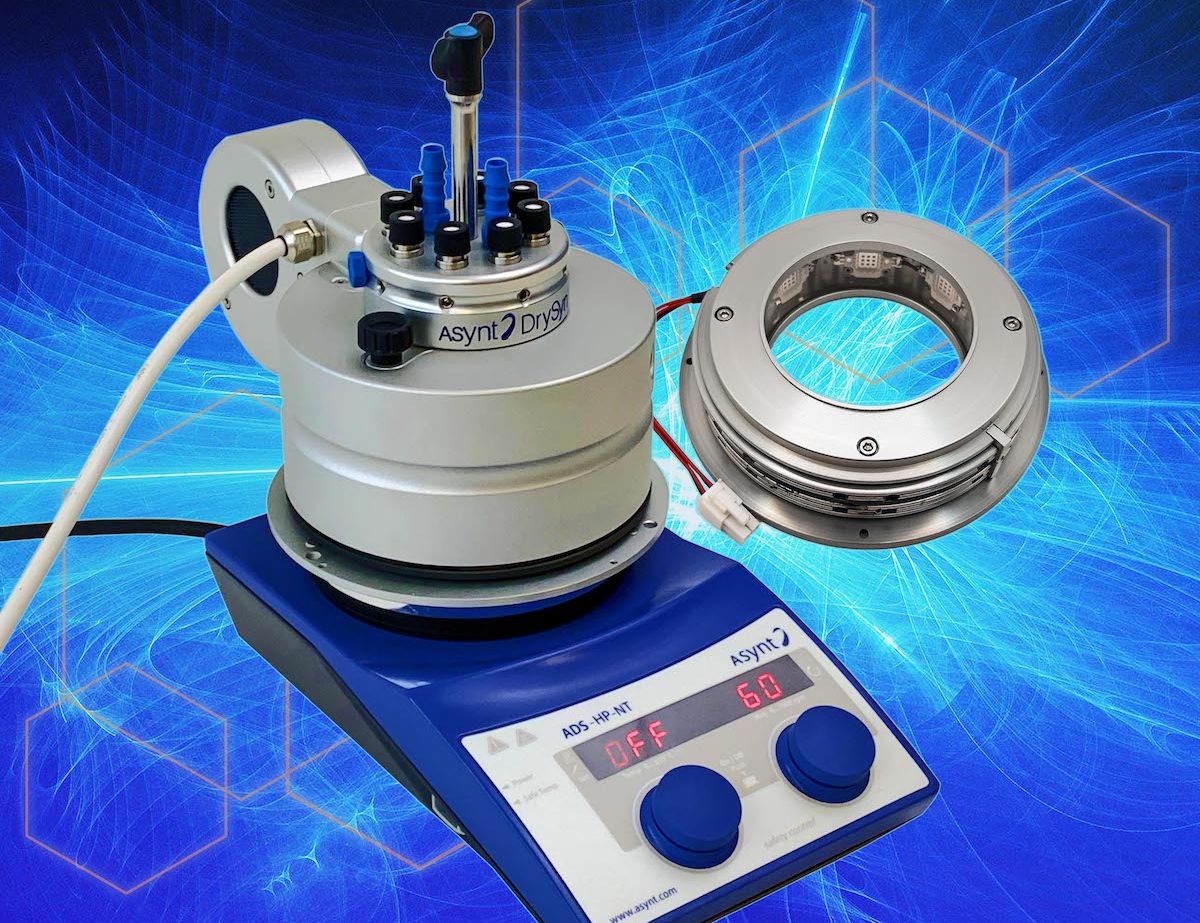 Asynt has introduced a new modular version of its popular LightSyn Illumin8 photoreactor. This innovative system provides researchers with the flexibility to change quickly and safely between a selection of high-power light emitting diodes (LEDs) operating at wavelengths including UV (365 nm) and blue (450 nm). The LightSyn Illumin8 allows chemists to run up to 8 photochemical reactions in parallel using low-cost 8 mL tubes...
Asynt has introduced a new modular version of its popular LightSyn Illumin8 photoreactor. This innovative system provides researchers with the flexibility to change quickly and safely between a selection of high-power light emitting diodes (LEDs) operating at wavelengths including UV (365 nm) and blue (450 nm). The LightSyn Illumin8 allows chemists to run up to 8 photochemical reactions in parallel using low-cost 8 mL tubes...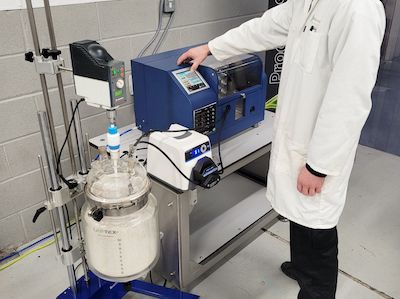 Asynt reports how AM Technology Ltd (Runcorn, UK) has used its ReactoMate ATOM lab reactor support stand to enhance the speed and ease of switching reaction vessels feeding their Coflore® flow chemistry system. Martin Monedero, principal chemist at AMT, commented "Our Coflore flow systems are designed to be as versatile as possible, enabling users to optimise feed vessel set up according to the requirements of a particular reaction. For users to be able to swap reaction vessels quickly and easily is a significant benefit...
Asynt reports how AM Technology Ltd (Runcorn, UK) has used its ReactoMate ATOM lab reactor support stand to enhance the speed and ease of switching reaction vessels feeding their Coflore® flow chemistry system. Martin Monedero, principal chemist at AMT, commented "Our Coflore flow systems are designed to be as versatile as possible, enabling users to optimise feed vessel set up according to the requirements of a particular reaction. For users to be able to swap reaction vessels quickly and easily is a significant benefit...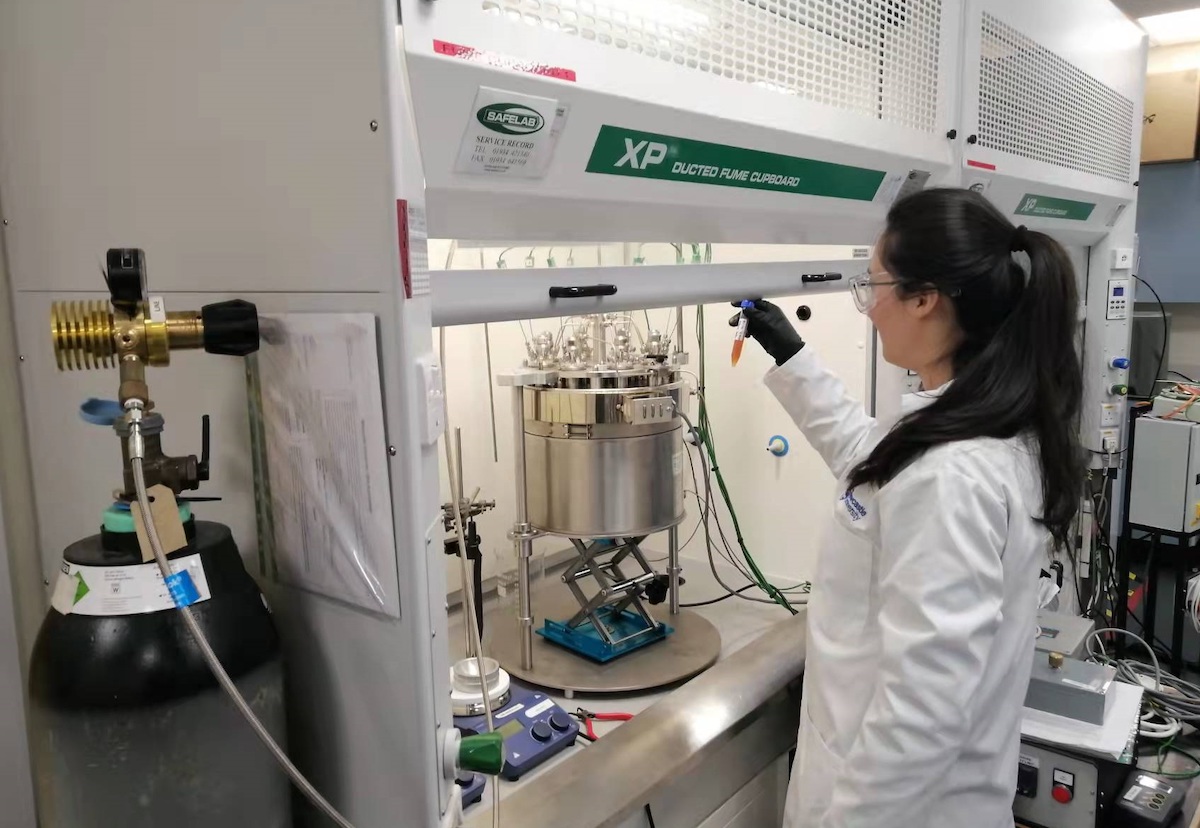 Asynt reports how the Process Intensification Group, within the School of Engineering at Newcastle University, UK is using the MultiCell-PLUS High-Pressure Reactor as part of their program of ongoing research to create a new environmentally friendly generation of catalysts for production of biorenewable chemicals. Many industrial processes rely on catalysts containing expensive precious and metals, or metals sourced from areas of conflict...
Asynt reports how the Process Intensification Group, within the School of Engineering at Newcastle University, UK is using the MultiCell-PLUS High-Pressure Reactor as part of their program of ongoing research to create a new environmentally friendly generation of catalysts for production of biorenewable chemicals. Many industrial processes rely on catalysts containing expensive precious and metals, or metals sourced from areas of conflict...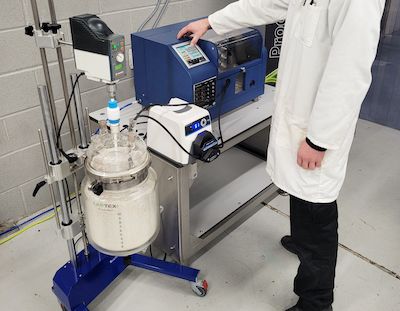 Asynt has supplied AM Technology Ltd (Runcorn, UK) with two ReactoMate ATOM lab reactor support stands to enhance the speed and ease of switching reaction vessels feeding their Coflore® flow chemistry systems. AMT's Coflore flow reactor range was developed to provide truly scalable flow chemistry solutions in a laboratory environment. Coflore technology provides efficient active-mixing even at very low flow rates, providing versatility...
Asynt has supplied AM Technology Ltd (Runcorn, UK) with two ReactoMate ATOM lab reactor support stands to enhance the speed and ease of switching reaction vessels feeding their Coflore® flow chemistry systems. AMT's Coflore flow reactor range was developed to provide truly scalable flow chemistry solutions in a laboratory environment. Coflore technology provides efficient active-mixing even at very low flow rates, providing versatility...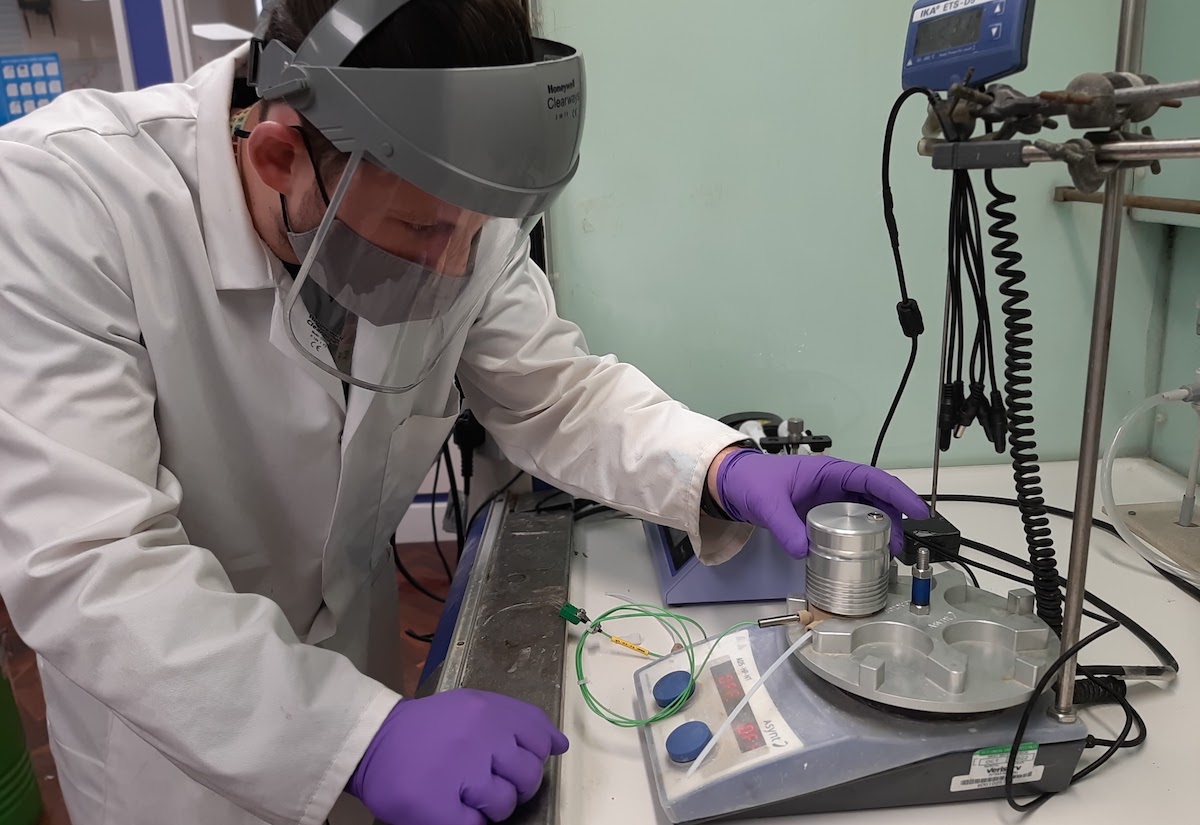 Asynt reports upon a new paper, written by a multidisciplinary team of experts at the Institute for Process Research and Chemistry (iRPD) at the University of Leeds (UK), that describes how the fReactor flow chemistry system with add-on photochemical flow modules improves synthetic reactions commonly used in the preparation of drug intermediates. In contrast to many tubular or plate-based flow chemistry systems, the Asynt fReactor with Photo Flow modules is especially well-suited...
Asynt reports upon a new paper, written by a multidisciplinary team of experts at the Institute for Process Research and Chemistry (iRPD) at the University of Leeds (UK), that describes how the fReactor flow chemistry system with add-on photochemical flow modules improves synthetic reactions commonly used in the preparation of drug intermediates. In contrast to many tubular or plate-based flow chemistry systems, the Asynt fReactor with Photo Flow modules is especially well-suited...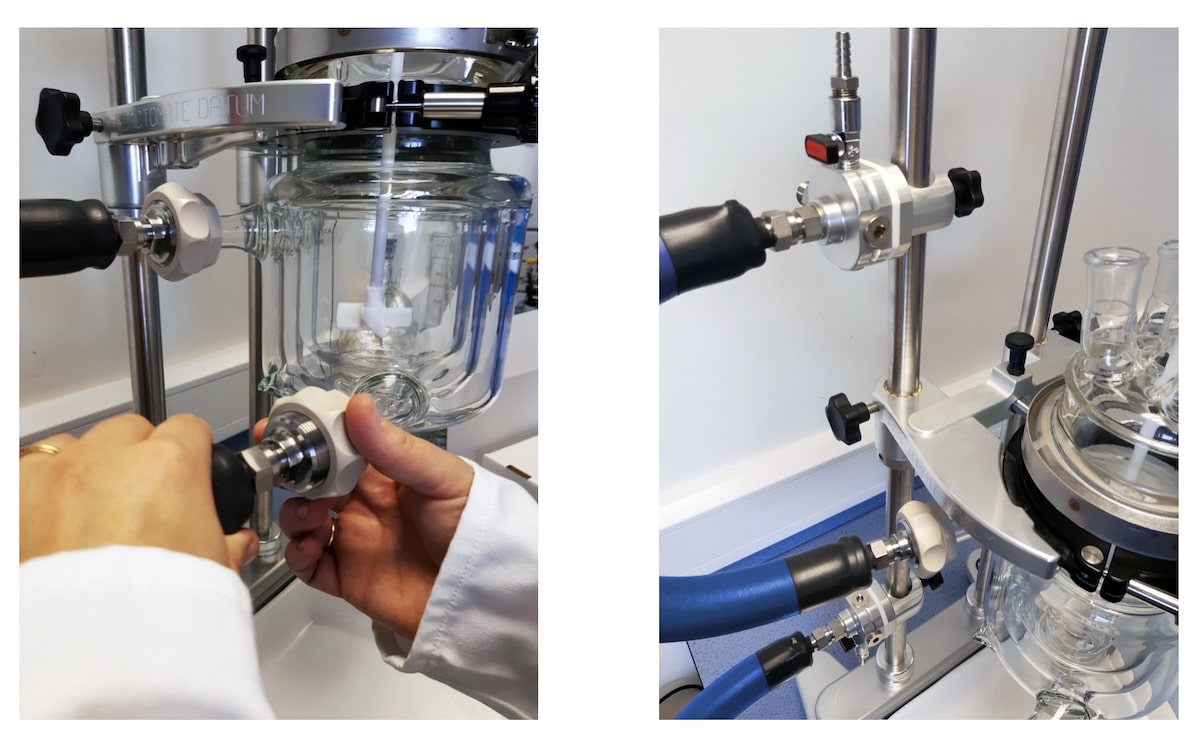 Asynt has introduced two new innovative kits for scale-up laboratories looking to minimise downtime when changing between different glass reactor vessels. Offering the flexibility to work with glass reactors from different manufacturers, the new ReactoMate Quick-release Couplings allow you to securely attach or detach flexible hosing to your DN or KF glassware in just seconds – with or without tools....
Asynt has introduced two new innovative kits for scale-up laboratories looking to minimise downtime when changing between different glass reactor vessels. Offering the flexibility to work with glass reactors from different manufacturers, the new ReactoMate Quick-release Couplings allow you to securely attach or detach flexible hosing to your DN or KF glassware in just seconds – with or without tools....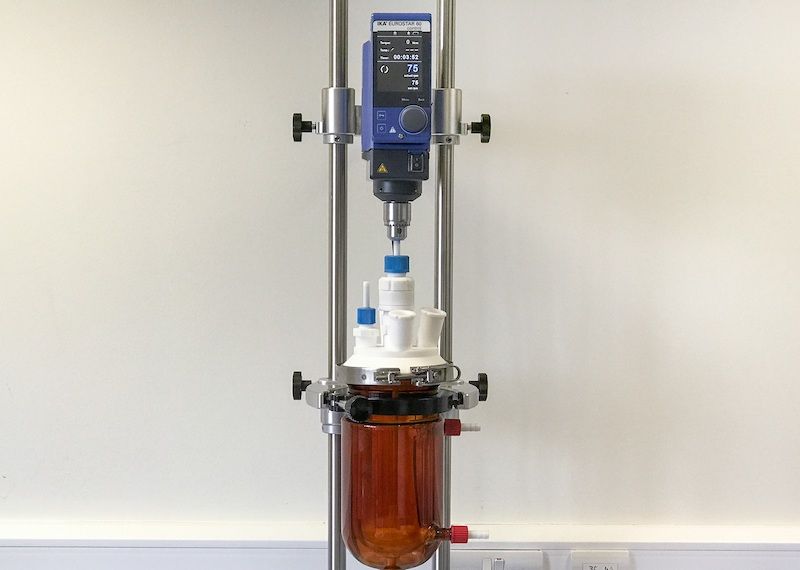 As a respected supplier of off-the-shelf laboratory reactor systems, Asynt has the in-depth knowledge and glassware manufacturing expertise to also offer bespoke glass reactor vessels to meet the exact demands of your application or project. Examples of bespoke glass laboratory reactors designed and manufactured by Asynt have ranged from tens of millilitres to 50 litres in capacity....
As a respected supplier of off-the-shelf laboratory reactor systems, Asynt has the in-depth knowledge and glassware manufacturing expertise to also offer bespoke glass reactor vessels to meet the exact demands of your application or project. Examples of bespoke glass laboratory reactors designed and manufactured by Asynt have ranged from tens of millilitres to 50 litres in capacity....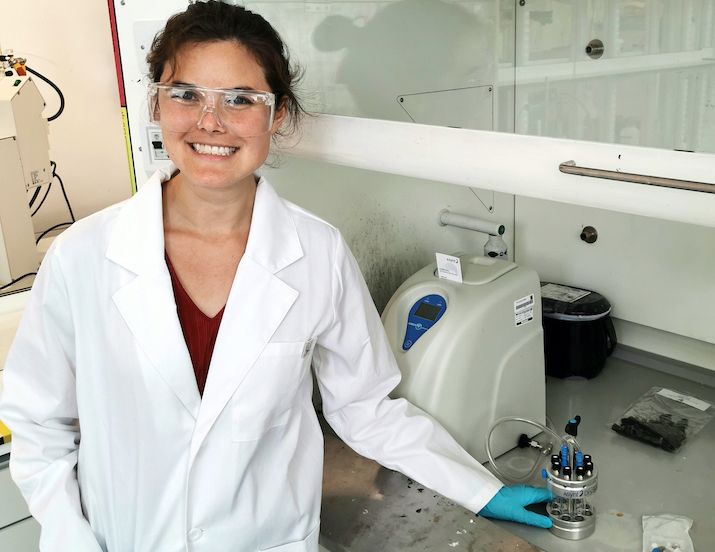 UK-based HydRegen are using a DrySyn OCTO reaction station from Asynt to help develop a next generation biocatalyst system that enables cleaner, safer, and more efficient chemical manufacture. HydRegen spun-out from the Vincent Group in the Dept. of Chemistry at the University of Oxford in March 2021. They are developing novel and sustainable strategies for using the growing toolbox of NADH-dependent redox biocatalysts in chemical synthesis...
UK-based HydRegen are using a DrySyn OCTO reaction station from Asynt to help develop a next generation biocatalyst system that enables cleaner, safer, and more efficient chemical manufacture. HydRegen spun-out from the Vincent Group in the Dept. of Chemistry at the University of Oxford in March 2021. They are developing novel and sustainable strategies for using the growing toolbox of NADH-dependent redox biocatalysts in chemical synthesis...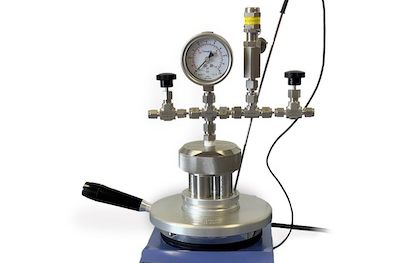 The Quadracell 4-position high pressure reactor from Asynt is a new synthetic tool for scientists seeking the convenience of routine parallel pressure chemistry in a compact footprint. Designed and manufactured in the UK, the robust Quadracell reactor is simple to set up and to operate, with heating and agitation provided by a standard magnetic hotplate stirrer and magnetic flea...
The Quadracell 4-position high pressure reactor from Asynt is a new synthetic tool for scientists seeking the convenience of routine parallel pressure chemistry in a compact footprint. Designed and manufactured in the UK, the robust Quadracell reactor is simple to set up and to operate, with heating and agitation provided by a standard magnetic hotplate stirrer and magnetic flea...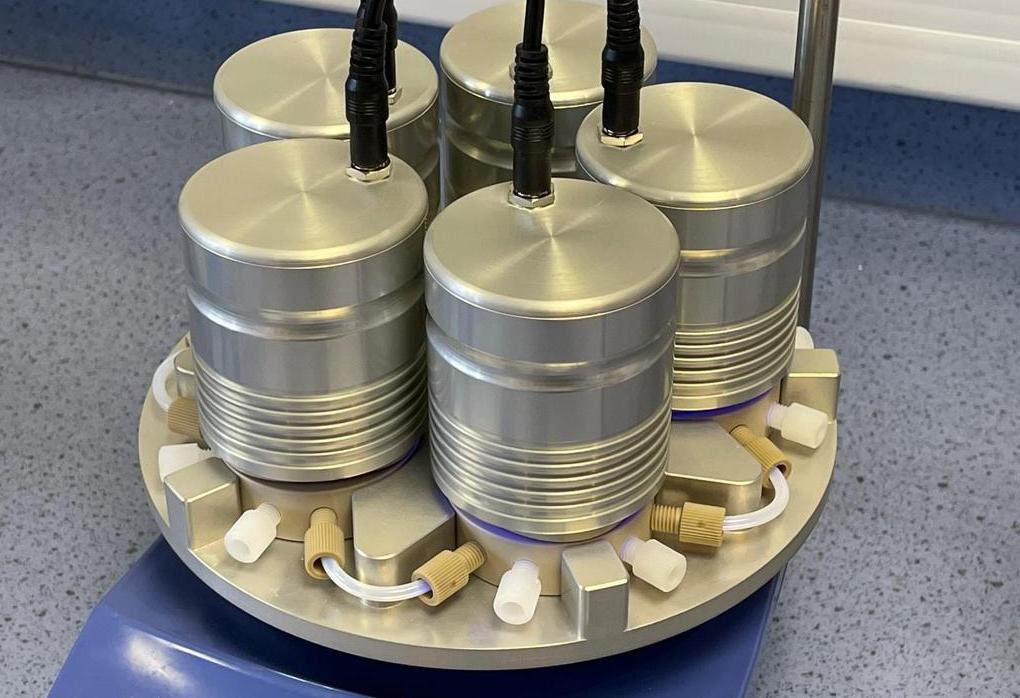 Developed by Asynt, in conjunction with the University of Leeds (UK), the fReactor Photo Flow provides an easy-to-use, yet powerful platform for scientists looking to explore photochemistry in Flow Chemistry applications. It is widely acknowledged that photocatalysis is a valuable synthetic tool for providing access to reaction pathways which would normally prove problematic or require multi-step synthetic routes using classical thermal or chemical activation methods....
Developed by Asynt, in conjunction with the University of Leeds (UK), the fReactor Photo Flow provides an easy-to-use, yet powerful platform for scientists looking to explore photochemistry in Flow Chemistry applications. It is widely acknowledged that photocatalysis is a valuable synthetic tool for providing access to reaction pathways which would normally prove problematic or require multi-step synthetic routes using classical thermal or chemical activation methods....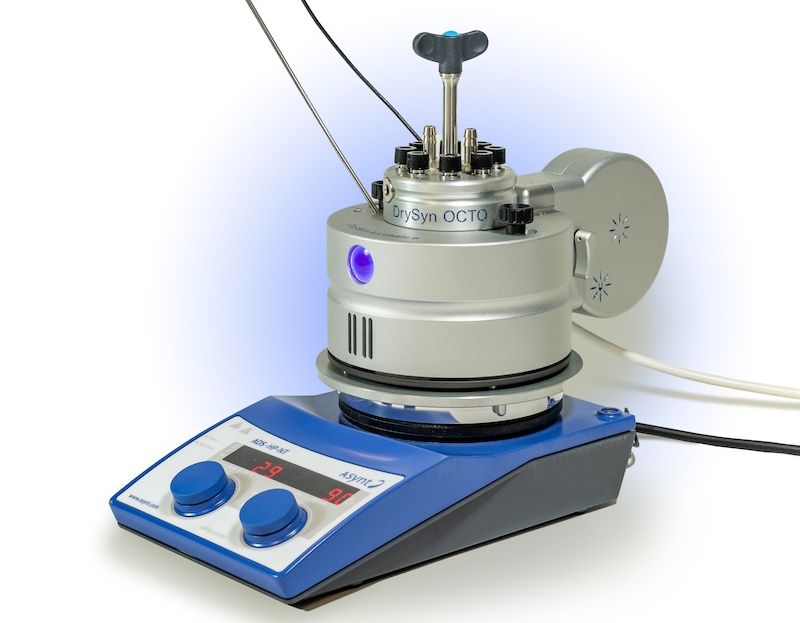 A new white paper, written by scientists at Liverpool ChiroChem (LCC), describes how the Asynt Illumin8 parallel photoreactor is being used to synthesise a range of new 2-Aryl N-Heterocycles. The discovery of a novel enantioselective synthetic pathway for reduction of pyridines to the corresponding chiral piperidines led to the formation of LCC in 2014. Since inception, LCC have enhanced their expertise enabling them to provide leading scientific organisations with access to chirally-pure compounds that play their part in small molecule drug discovery....
A new white paper, written by scientists at Liverpool ChiroChem (LCC), describes how the Asynt Illumin8 parallel photoreactor is being used to synthesise a range of new 2-Aryl N-Heterocycles. The discovery of a novel enantioselective synthetic pathway for reduction of pyridines to the corresponding chiral piperidines led to the formation of LCC in 2014. Since inception, LCC have enhanced their expertise enabling them to provide leading scientific organisations with access to chirally-pure compounds that play their part in small molecule drug discovery....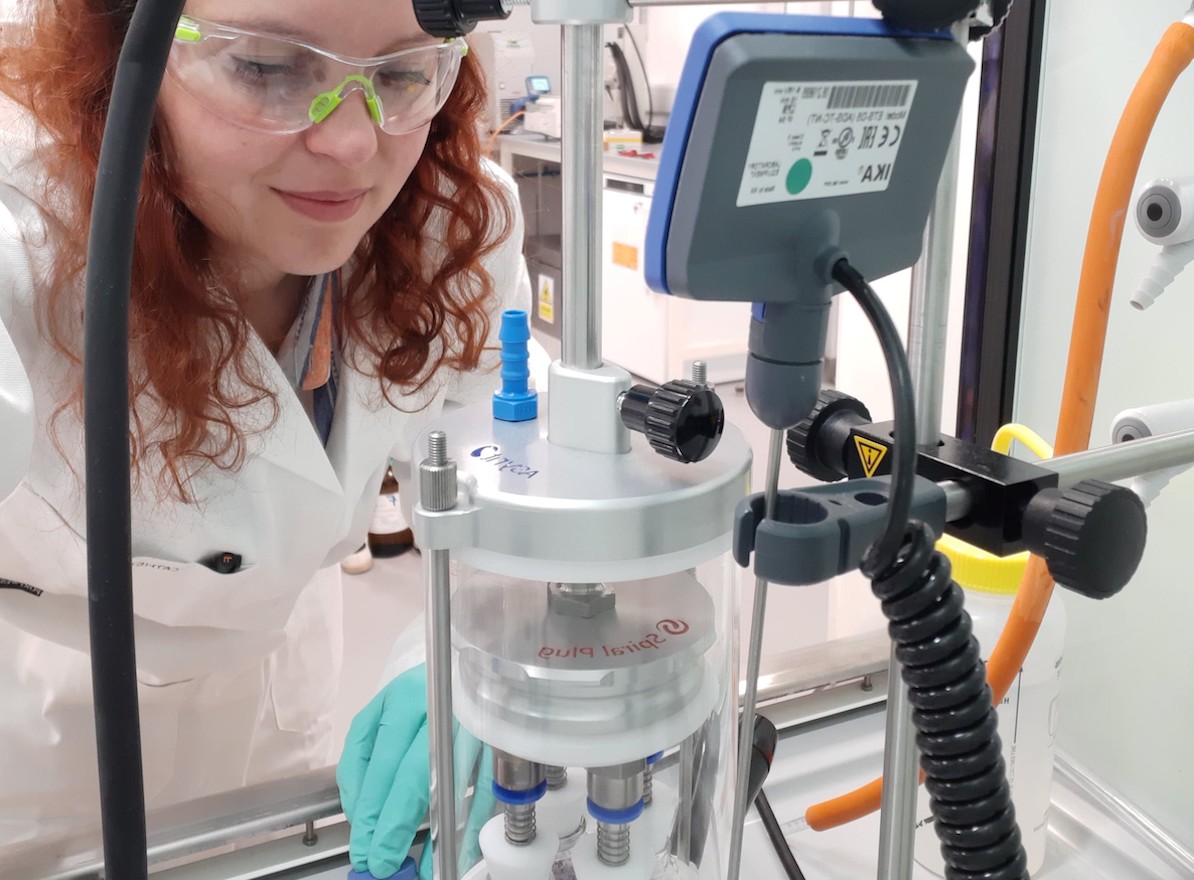 Researchers from the School of Chemistry at the University of St Andrews (UK) are using a DrySyn Spiral Evaporator from Asynt to help synthesize novel reactive colloidal nanoparticles that present an exciting tool to create a new generation of 'smart' nanomaterials. The unique properties of nanomaterials mean that potential applications extend from use in smart drug delivery systems through to new catalysts and helping to deliver greater efficiency in solar cells....
Researchers from the School of Chemistry at the University of St Andrews (UK) are using a DrySyn Spiral Evaporator from Asynt to help synthesize novel reactive colloidal nanoparticles that present an exciting tool to create a new generation of 'smart' nanomaterials. The unique properties of nanomaterials mean that potential applications extend from use in smart drug delivery systems through to new catalysts and helping to deliver greater efficiency in solar cells....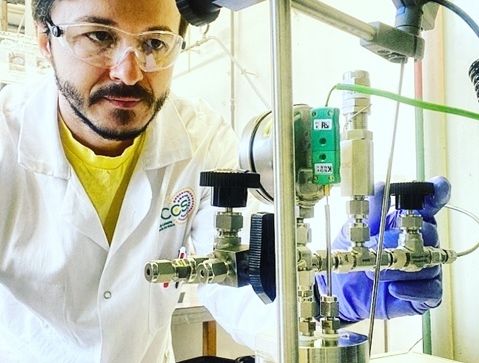
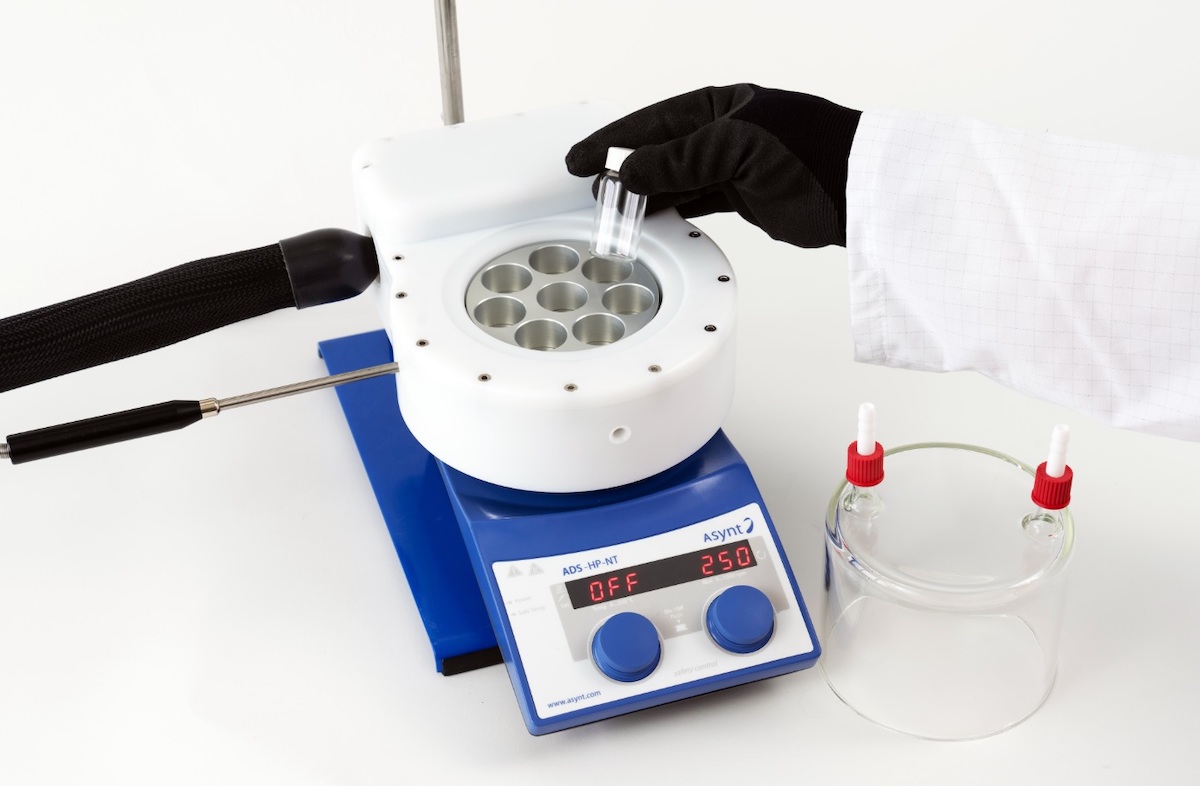 Asynt has published a case study describing how the FroSyn Cooling Station has enabled John Bower’s Group at the University of Liverpool (UK) to reproducibly conduct low temperature enantioselective catalytic reactions, over an extended period of time. The FroSyn system, jointly developed by Asynt and temperature control specialists, Julabo UK, offers a versatile, stand-alone solution to low temperature synthetic chemistry without the drawbacks of traditional reaction cooling using dry ice / solvent baths...
Asynt has published a case study describing how the FroSyn Cooling Station has enabled John Bower’s Group at the University of Liverpool (UK) to reproducibly conduct low temperature enantioselective catalytic reactions, over an extended period of time. The FroSyn system, jointly developed by Asynt and temperature control specialists, Julabo UK, offers a versatile, stand-alone solution to low temperature synthetic chemistry without the drawbacks of traditional reaction cooling using dry ice / solvent baths...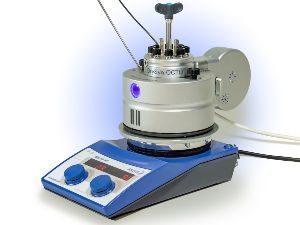 Asynt announce the DrySyn Illumin8 - a new, beautifully engineered, 8-position parallel photoreactor for research chemists. Based upon a modified version of Asynt’s popular DrySyn OCTO reactor, the DrySyn Illumin8 allows users to run up to 8 parallel photochemical reactions at a time in precision borosilicate tubes, up to 6 mL in volume. The unit mounts on a standard magnetic hotplate stirrer enabling powerful agitation and heating (up to 80 °C)...
Asynt announce the DrySyn Illumin8 - a new, beautifully engineered, 8-position parallel photoreactor for research chemists. Based upon a modified version of Asynt’s popular DrySyn OCTO reactor, the DrySyn Illumin8 allows users to run up to 8 parallel photochemical reactions at a time in precision borosilicate tubes, up to 6 mL in volume. The unit mounts on a standard magnetic hotplate stirrer enabling powerful agitation and heating (up to 80 °C)...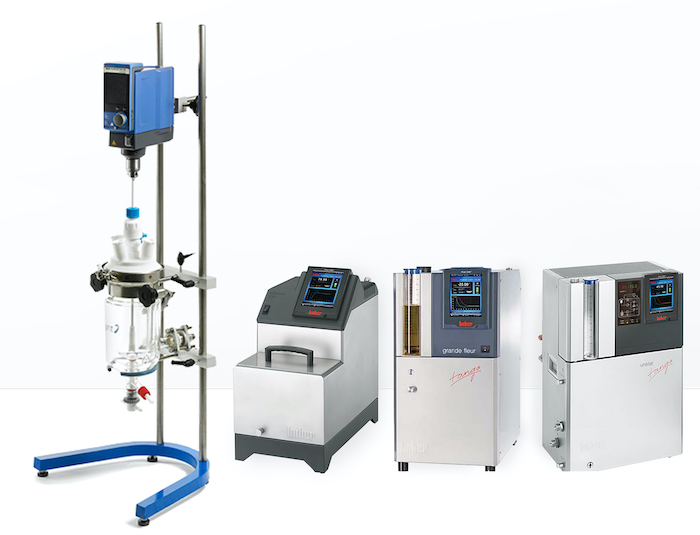 Asynt reports how Globachem Discovery (Alderley Park, UK) has benefited from the investment in ReactoMate reactor systems for the scale-up of novel agrochemicals. Globachem Discovery is the UK R&D arm of Globachem, a Belgian agrochemical business. The company operates in the early phases of the R&D pipeline, developing new molecules and chemistries for the agrochemical industry....
Asynt reports how Globachem Discovery (Alderley Park, UK) has benefited from the investment in ReactoMate reactor systems for the scale-up of novel agrochemicals. Globachem Discovery is the UK R&D arm of Globachem, a Belgian agrochemical business. The company operates in the early phases of the R&D pipeline, developing new molecules and chemistries for the agrochemical industry....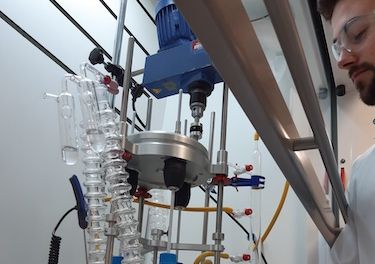 Asynt has supplied Polymer Mimetics (Liverpool, UK) with a range of synthetic chemistry equipment to exploit novel chemistries to produce a new generation of high-performance polymers. Polymer Mimetics is a joint venture between the University of Liverpool, and Scott Bader Company Ltd. building upon a new polymerisation process developed by Professor Steve Rannard from the University’s Department of Chemistry....
Asynt has supplied Polymer Mimetics (Liverpool, UK) with a range of synthetic chemistry equipment to exploit novel chemistries to produce a new generation of high-performance polymers. Polymer Mimetics is a joint venture between the University of Liverpool, and Scott Bader Company Ltd. building upon a new polymerisation process developed by Professor Steve Rannard from the University’s Department of Chemistry....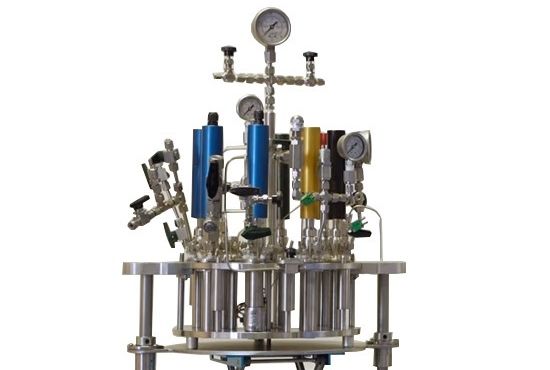 The Multicell PLUS is an exciting addition to the Asynt range of pressure reactors, offering scientists an extremely flexible and customisable device for screening chemical reactions under high pressure conditions. With its own unique safety-locking mechanism and robust, adjustable support frame / lifting platform option, the Multicell PLUS high-pressure reactor sets a new benchmark for operator safety, all-round accessibility and ease-of-use...
The Multicell PLUS is an exciting addition to the Asynt range of pressure reactors, offering scientists an extremely flexible and customisable device for screening chemical reactions under high pressure conditions. With its own unique safety-locking mechanism and robust, adjustable support frame / lifting platform option, the Multicell PLUS high-pressure reactor sets a new benchmark for operator safety, all-round accessibility and ease-of-use...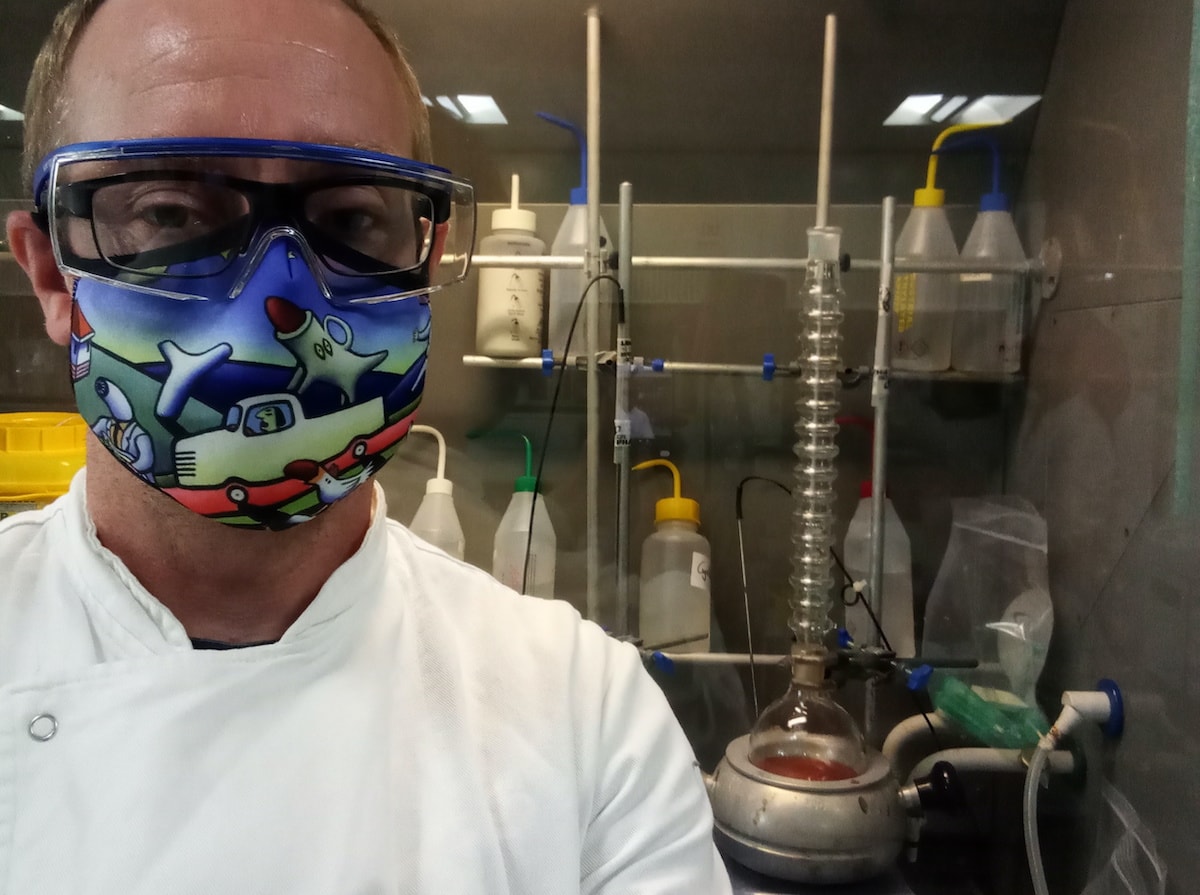 The CondenSyn waterless condenser from Asynt has been widely adopted by the Technicians Sustainability Working Group (TSWG) operating within the Biomolecular Science and Medicinal Chemistry Division at Nottingham University (UK) as part of their drive to make teaching and research greener. Drawing upon their pivotal role at the forefront of laboratory work, the TSWG was formed by lab technicians from across all Nottingham University campuses....
The CondenSyn waterless condenser from Asynt has been widely adopted by the Technicians Sustainability Working Group (TSWG) operating within the Biomolecular Science and Medicinal Chemistry Division at Nottingham University (UK) as part of their drive to make teaching and research greener. Drawing upon their pivotal role at the forefront of laboratory work, the TSWG was formed by lab technicians from across all Nottingham University campuses....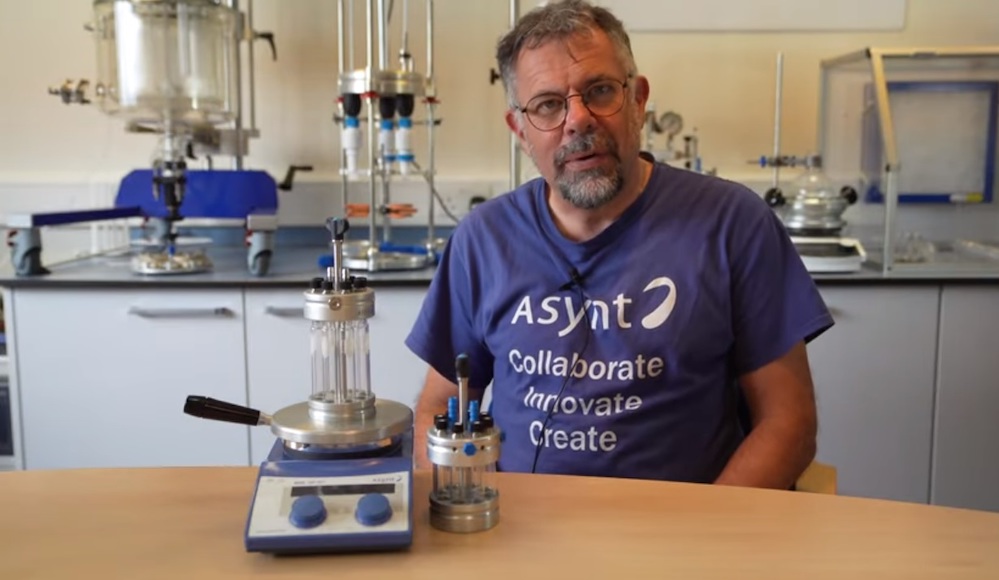 Asynt has introduced a second-generation version of its popular DrySyn OCTO reaction station that delivers the same outstanding performance, at the same price, with improved features and a new, more aesthetically pleasing, design. Like its popular predecessor, the DrySyn OCTO Mk II is an 8-position reaction station that provides chemists with powerful magnetic stirring, heating, inert atmosphere....
Asynt has introduced a second-generation version of its popular DrySyn OCTO reaction station that delivers the same outstanding performance, at the same price, with improved features and a new, more aesthetically pleasing, design. Like its popular predecessor, the DrySyn OCTO Mk II is an 8-position reaction station that provides chemists with powerful magnetic stirring, heating, inert atmosphere.... The ReactoMate DATUM from Asynt is a high quality, dual-rod stainless steel and aluminium support system built to ensure the stability and safety of your lab reactor. Sturdy, yet compact, the ReactoMate DATUM support system can accommodate a wide range of reaction vessels from 100 mL up to 5000 mL. Designed with user-friendliness in mind, the ReactoMate DATUM support system incorporates a suite of innovative features....
The ReactoMate DATUM from Asynt is a high quality, dual-rod stainless steel and aluminium support system built to ensure the stability and safety of your lab reactor. Sturdy, yet compact, the ReactoMate DATUM support system can accommodate a wide range of reaction vessels from 100 mL up to 5000 mL. Designed with user-friendliness in mind, the ReactoMate DATUM support system incorporates a suite of innovative features....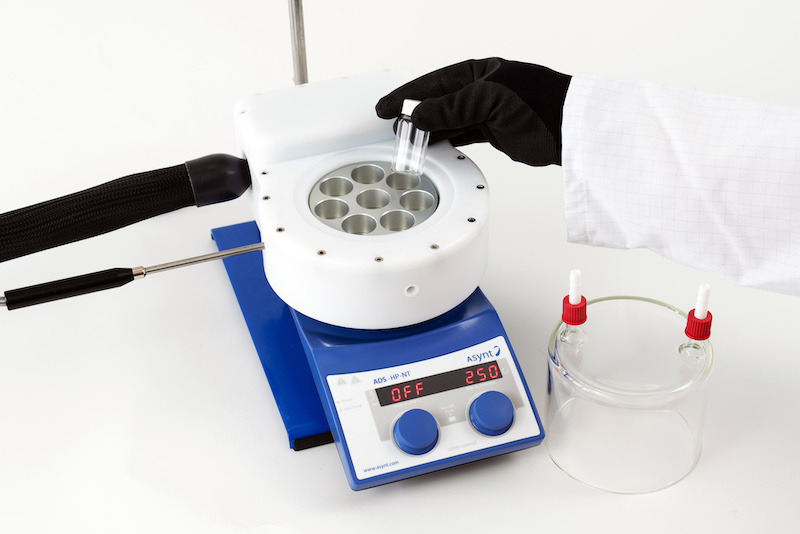 Asynt announces FroSyn - an innovative fluid-free cooling plate that enables rapid cooling of samples in vials or round bottom flasks (up to 500 mL) to below -60 °C. Designed in conjunction with temperature control specialists - Julabo GmbH, FroSyn represents a next generation sustainable alternative to using traditional ice and dry ice (CO2) cooling baths...
Asynt announces FroSyn - an innovative fluid-free cooling plate that enables rapid cooling of samples in vials or round bottom flasks (up to 500 mL) to below -60 °C. Designed in conjunction with temperature control specialists - Julabo GmbH, FroSyn represents a next generation sustainable alternative to using traditional ice and dry ice (CO2) cooling baths...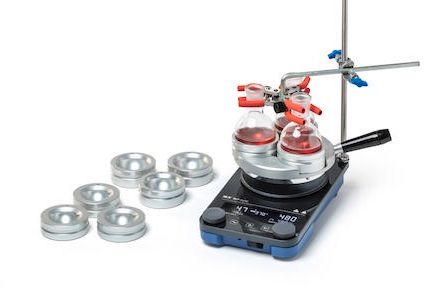 The DrySyn range of heating & cooling blocks from Asynt is enabling laboratories around the world to undertake clean, safe synthetic reactions both individually or in parallel. Driven by the growing global demand for more sustainable and user-friendly laboratory products, the DrySyn range offers a clean, safe alternative to oil baths and heating mantles which both reduces costs in purchasing and disposal of oil, and offers a reduction in energy consumption....
The DrySyn range of heating & cooling blocks from Asynt is enabling laboratories around the world to undertake clean, safe synthetic reactions both individually or in parallel. Driven by the growing global demand for more sustainable and user-friendly laboratory products, the DrySyn range offers a clean, safe alternative to oil baths and heating mantles which both reduces costs in purchasing and disposal of oil, and offers a reduction in energy consumption....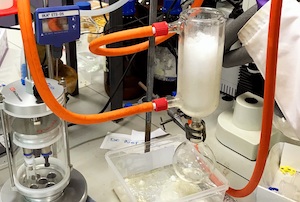 The DrySyn Spiral Evaporator from Asynt is enabling the Cresswell Group within the Department of Chemistry at the University of Bath (UK) to improve and streamline many aspects of their synthetic organic methods development. The research activities of the Cresswell Group are focused on new reaction development, and the exploitation of novel or underutilised reactivity....
The DrySyn Spiral Evaporator from Asynt is enabling the Cresswell Group within the Department of Chemistry at the University of Bath (UK) to improve and streamline many aspects of their synthetic organic methods development. The research activities of the Cresswell Group are focused on new reaction development, and the exploitation of novel or underutilised reactivity....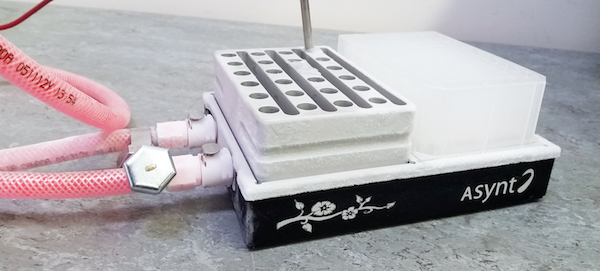 The DrySyn ChilliBlock from Asynt allows you to undertake sensitive biological assays in a temperature-controlled manor, vastly reducing the risk of expensive biological samples, reagents or enzymes degrading due to adverse temperature conditions. Traditionally methods of cooling biological assays have relied upon direct immersion in insulated ice buckets which are prone to....
The DrySyn ChilliBlock from Asynt allows you to undertake sensitive biological assays in a temperature-controlled manor, vastly reducing the risk of expensive biological samples, reagents or enzymes degrading due to adverse temperature conditions. Traditionally methods of cooling biological assays have relied upon direct immersion in insulated ice buckets which are prone to....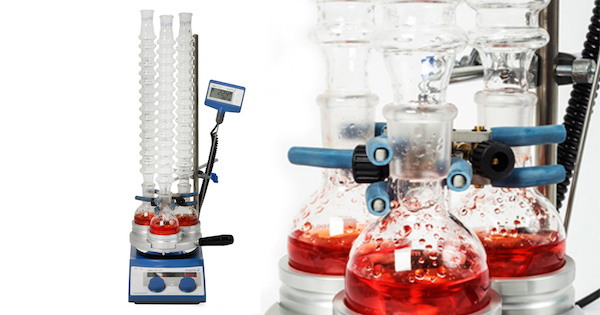 Asynt reports upon a new scientific evaluation of their Condensyn waterless condenser by the Technological University Dublin (TU Dublin) in the key areas of performance versus Liebig water condensers, water savings potential and flood prevention. Driven by concern over numerous lab flooding incidents in their synthetic chemistry labs at both undergraduate and postgraduate levels from the use of...
Asynt reports upon a new scientific evaluation of their Condensyn waterless condenser by the Technological University Dublin (TU Dublin) in the key areas of performance versus Liebig water condensers, water savings potential and flood prevention. Driven by concern over numerous lab flooding incidents in their synthetic chemistry labs at both undergraduate and postgraduate levels from the use of...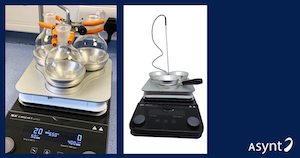 Asynt announces the DrySyn Multi-M high temperature adapter - a unique product that enables scientists to undertake parallel reactions that require solution temperatures of over 400°C.
Asynt announces the DrySyn Multi-M high temperature adapter - a unique product that enables scientists to undertake parallel reactions that require solution temperatures of over 400°C. 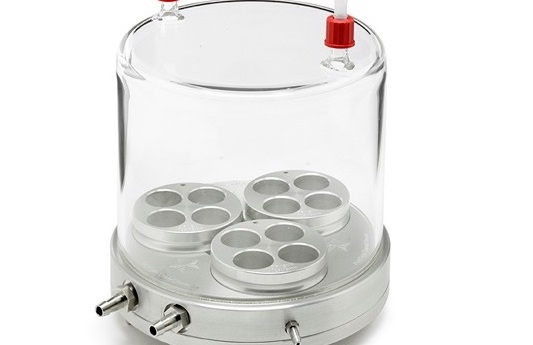 The DrySyn SnowStorm range from Asynt offers an attractive solution for scientists looking to undertake low temperature chemical reactions and studies. Unlike traditional reaction cooling methods, including ice, dry-ice and liquid nitrogen; accurate and prolonged temperature control on a DrySyn SnowStorm is regulated by an external thermostatic circulator. The use of such a temperature control system not only eliminates the risk of temperature fluctuations due to perishable coolants, but can also improve...
The DrySyn SnowStorm range from Asynt offers an attractive solution for scientists looking to undertake low temperature chemical reactions and studies. Unlike traditional reaction cooling methods, including ice, dry-ice and liquid nitrogen; accurate and prolonged temperature control on a DrySyn SnowStorm is regulated by an external thermostatic circulator. The use of such a temperature control system not only eliminates the risk of temperature fluctuations due to perishable coolants, but can also improve...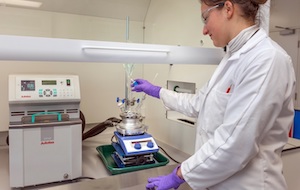 The DrySyn SnowStorm range from Asynt offers an attractive solution for scientists looking to undertake low temperature chemical reactions and studies. Unlike traditional reaction cooling methods, including ice, dry-ice and liquid nitrogen; accurate and prolonged temperature control on a DrySyn SnowStorm is regulated by an external thermostatic circulator. The use of such a temperature control system not only eliminates the risk of temperature fluctuation.....
The DrySyn SnowStorm range from Asynt offers an attractive solution for scientists looking to undertake low temperature chemical reactions and studies. Unlike traditional reaction cooling methods, including ice, dry-ice and liquid nitrogen; accurate and prolonged temperature control on a DrySyn SnowStorm is regulated by an external thermostatic circulator. The use of such a temperature control system not only eliminates the risk of temperature fluctuation.....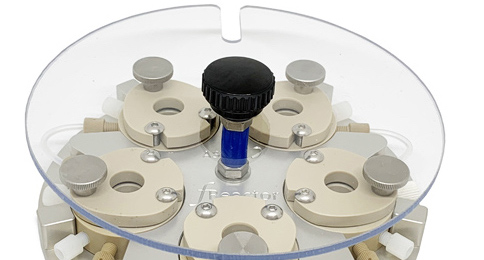 Asynt announces their exciting new flow-chemistry platform, the fReactor, an affordable device created to bring the many advantages of flow chemistry to your laboratory through easy-to-use, flexible and intuitive design. Developed in collaboration with chemists and chemical engineers from the renowned Institute of Process Research and Development (iPRD) at the University of Leeds (UK), the fReactor is simple to assemble and modify, making it suitable for...
Asynt announces their exciting new flow-chemistry platform, the fReactor, an affordable device created to bring the many advantages of flow chemistry to your laboratory through easy-to-use, flexible and intuitive design. Developed in collaboration with chemists and chemical engineers from the renowned Institute of Process Research and Development (iPRD) at the University of Leeds (UK), the fReactor is simple to assemble and modify, making it suitable for...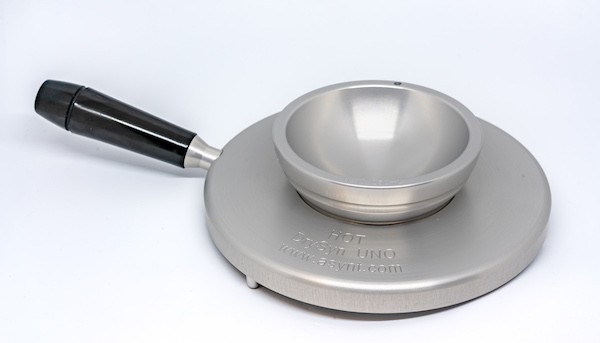 Asynt announces the DrySyn UNO Base - a versatile entry-level reactor flask heating system with heat resistant handle making it the perfect way to conduct safe experiments in academic teaching and research labs. Designed and manufactured in the UK, the new DrySyn UNO Base provides a simple but effective tool for safe heating and clamping of a single flask or vial using a DrySyn Reaction Vial insert...
Asynt announces the DrySyn UNO Base - a versatile entry-level reactor flask heating system with heat resistant handle making it the perfect way to conduct safe experiments in academic teaching and research labs. Designed and manufactured in the UK, the new DrySyn UNO Base provides a simple but effective tool for safe heating and clamping of a single flask or vial using a DrySyn Reaction Vial insert...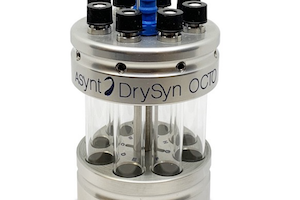 Asynt has introduced the DrySyn OCTO Mini Conversion Kit to enable chemists to efficiently sample reactions performed using their DrySyn OCTO 8-position parallel synthesiser. The DrySyn OCTO is a compact, entry-level parallel synthesiser for chemists wishing to conduct synthetic reactions under an inert atmosphere with temperature control and powerful magnetic stirring. The new Mini Conversion Kit lets you quickly adapt a standard...
Asynt has introduced the DrySyn OCTO Mini Conversion Kit to enable chemists to efficiently sample reactions performed using their DrySyn OCTO 8-position parallel synthesiser. The DrySyn OCTO is a compact, entry-level parallel synthesiser for chemists wishing to conduct synthetic reactions under an inert atmosphere with temperature control and powerful magnetic stirring. The new Mini Conversion Kit lets you quickly adapt a standard...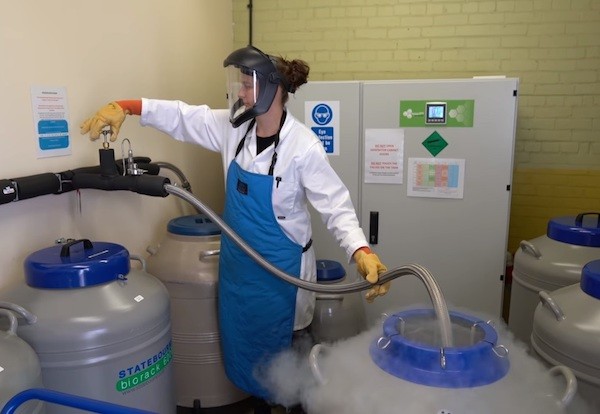 Asynt report on how installation of a Liquid Nitrogen generator at the Scottish Association for Marine Science (SAMS) is helping the organisation improve long term cryostorage of their precious samples in an environmentally friendly manner. The Scottish Association for Marine Science (SAMS) is Scotland's premier independent marine science organisation generating new knowledge for the benefit of the marine environment and society since 1884. Scientists at the SAMS Institute study how the marine environment works....
Asynt report on how installation of a Liquid Nitrogen generator at the Scottish Association for Marine Science (SAMS) is helping the organisation improve long term cryostorage of their precious samples in an environmentally friendly manner. The Scottish Association for Marine Science (SAMS) is Scotland's premier independent marine science organisation generating new knowledge for the benefit of the marine environment and society since 1884. Scientists at the SAMS Institute study how the marine environment works.... Reflecting customer demand, Asynt have continued to expand their range of DrySyn heating block systems for reactions in tubes, vials and flasks. In 2018 - Asynt introduced new DrySyn inserts enabling scientists to heat reactions in 11.80mm, 15.00mm and 27.65mm diameter vials. In addition, the company has introduced the ADS2-2 DrySyn MAXI stand-alone 2L base for laboratories wanting to heat larger scale flask-based reactions and the DrySyn SuperMAXI 4L insert for use with the SuperMAXI 5L base...
Reflecting customer demand, Asynt have continued to expand their range of DrySyn heating block systems for reactions in tubes, vials and flasks. In 2018 - Asynt introduced new DrySyn inserts enabling scientists to heat reactions in 11.80mm, 15.00mm and 27.65mm diameter vials. In addition, the company has introduced the ADS2-2 DrySyn MAXI stand-alone 2L base for laboratories wanting to heat larger scale flask-based reactions and the DrySyn SuperMAXI 4L insert for use with the SuperMAXI 5L base...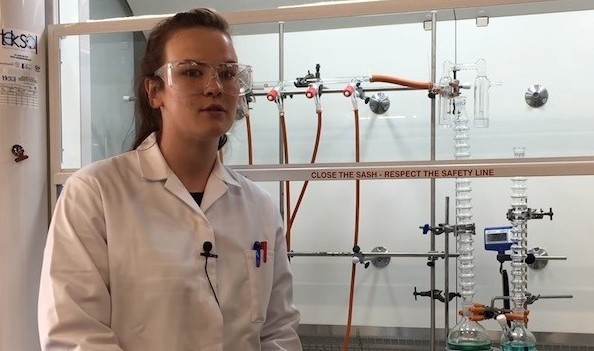 Asynt reports how the Rannard Group at the Materials Innovation Factory, at the University of Liverpool (UK), uses new technologies supplied by the company to help improve the environmental impact and reduce water and electrical consumption within their materials science discovery laboratories...
Asynt reports how the Rannard Group at the Materials Innovation Factory, at the University of Liverpool (UK), uses new technologies supplied by the company to help improve the environmental impact and reduce water and electrical consumption within their materials science discovery laboratories...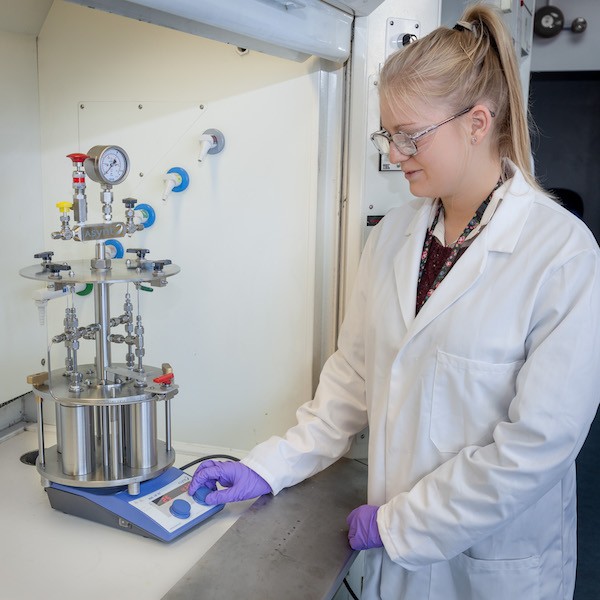 Proven in numerous installations worldwide, the Asynt High Pressure Parallel Reactor can be custom configured to optimally suit applications including homogeneous and heterogeneous catalysis, hydrogenation, carbonylation, corrosion testing, parallel synthesis and screening. Typically constructed from durable 316 stainless steel - the High Pressure Parallel Reactor is an affordable...
Proven in numerous installations worldwide, the Asynt High Pressure Parallel Reactor can be custom configured to optimally suit applications including homogeneous and heterogeneous catalysis, hydrogenation, carbonylation, corrosion testing, parallel synthesis and screening. Typically constructed from durable 316 stainless steel - the High Pressure Parallel Reactor is an affordable...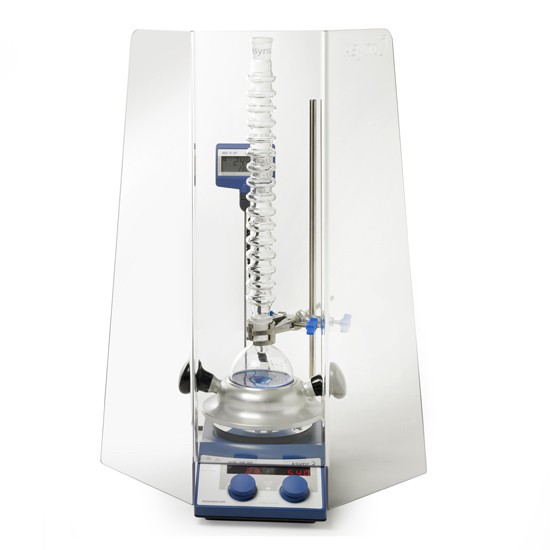 Asynt has expanded its range of Lab Safety Shields. Manufactured in the UK, Asynt Lab Safety Shields fit neatly around all major stirrer hotplate brands providing lab scientists with enhanced safety while maintaining easy access to hotplate controls and good all-round visibility of the reaction or process....
Asynt has expanded its range of Lab Safety Shields. Manufactured in the UK, Asynt Lab Safety Shields fit neatly around all major stirrer hotplate brands providing lab scientists with enhanced safety while maintaining easy access to hotplate controls and good all-round visibility of the reaction or process....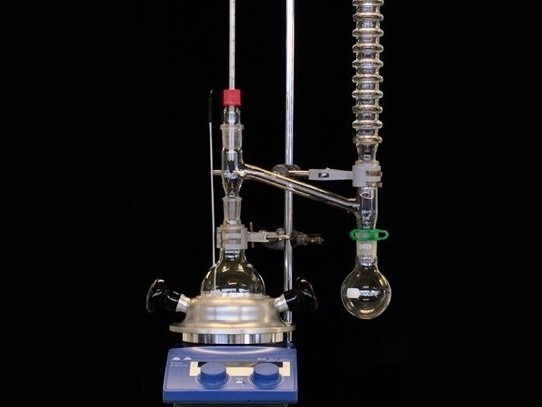 Asynt in partnership with the University of East Anglia (Norwich, UK) has developed the new CondenSyn Distillation Adapter as an aid to chemistry labs worldwide seeking to go water-free.
Asynt in partnership with the University of East Anglia (Norwich, UK) has developed the new CondenSyn Distillation Adapter as an aid to chemistry labs worldwide seeking to go water-free. 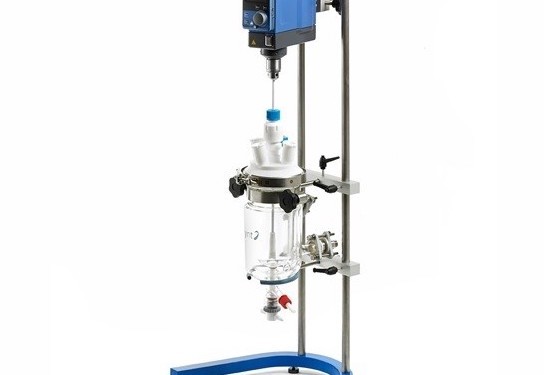 Asynt announces its newest member of the ReactoMate reactor family, the “QUANTUM” support stand is the perfect addition to any process chemistry laboratory. Designed to be an affordable entry-level system - QUANTUM is easy to set up and provides secure and stable support for all reaction vessels from 100ml right up to 5,000ml. Manufactured in the UK using durable stainless steel - QUANTUM does not compromise on quality...
Asynt announces its newest member of the ReactoMate reactor family, the “QUANTUM” support stand is the perfect addition to any process chemistry laboratory. Designed to be an affordable entry-level system - QUANTUM is easy to set up and provides secure and stable support for all reaction vessels from 100ml right up to 5,000ml. Manufactured in the UK using durable stainless steel - QUANTUM does not compromise on quality...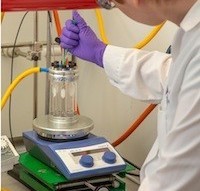 Asynt reports on how a DrySyn OCTO 8-position parallel synthesiser has benefited early stage discovery chemistry at Cancer Research UK (Cambridge, UK). Designed to work with any hotplate stirrer, the DrySyn Octo has enabled the CRUK Therapeutic Discovery Laboratories to increase the productivity of their small-scale synthetic reactions....
Asynt reports on how a DrySyn OCTO 8-position parallel synthesiser has benefited early stage discovery chemistry at Cancer Research UK (Cambridge, UK). Designed to work with any hotplate stirrer, the DrySyn Octo has enabled the CRUK Therapeutic Discovery Laboratories to increase the productivity of their small-scale synthetic reactions....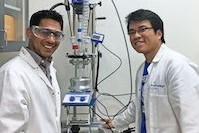 Asynt has supplied and installed a ReactoMate laboratory reactor system within the Department of Chemical Engineering at Imperial College London. Comprising of bespoke glass reactor vessel, ReactoMate Datum support stand and DrySyn heating block system, the reactor setup will help further research into the fluid dynamics of fine particulate materials....
Asynt has supplied and installed a ReactoMate laboratory reactor system within the Department of Chemical Engineering at Imperial College London. Comprising of bespoke glass reactor vessel, ReactoMate Datum support stand and DrySyn heating block system, the reactor setup will help further research into the fluid dynamics of fine particulate materials.... Asynt reports that medicinal chemistry specialists Charnwood Molecular (Loughborough UK) have been using the DrySyn MAXI heating system to successfully and reproducibly scale up syntheses within their contract research laboratories. Dr Michael McKenzie, Head of Operations, said: “Here at Charnwood Molecular our experienced preclinical R&D team routinely investigate the development of small scale medicinal chemistry routes in order to facilitate the timely supply of...
Asynt reports that medicinal chemistry specialists Charnwood Molecular (Loughborough UK) have been using the DrySyn MAXI heating system to successfully and reproducibly scale up syntheses within their contract research laboratories. Dr Michael McKenzie, Head of Operations, said: “Here at Charnwood Molecular our experienced preclinical R&D team routinely investigate the development of small scale medicinal chemistry routes in order to facilitate the timely supply of...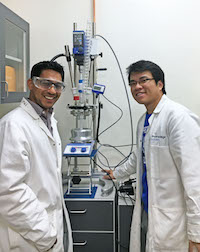 Asynt announces “Asyntise” a consultation, design and manufacture service whereby the company collaborates with scientists to create practical tools to help fulfil their research needs.
Asynt announces “Asyntise” a consultation, design and manufacture service whereby the company collaborates with scientists to create practical tools to help fulfil their research needs. 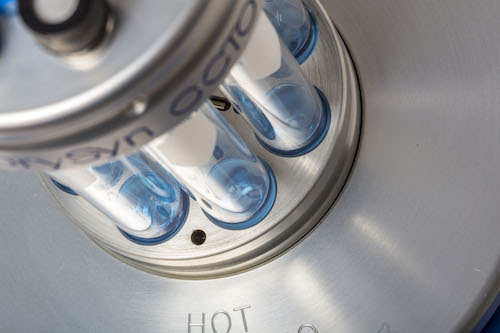 Asynt announces “Asyntise” a consultation, design and manufacture service whereby the company collaborates with scientists to create practical tools to help fulfil their research needs.
Asynt announces “Asyntise” a consultation, design and manufacture service whereby the company collaborates with scientists to create practical tools to help fulfil their research needs. 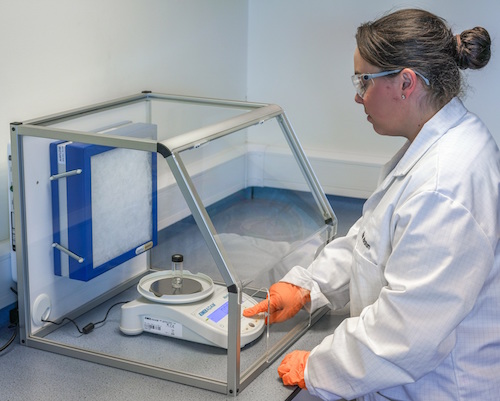 The Asynt GP540 is a new bench-mounted, general-purpose, ventilated laboratory cabinet designed for use in a wide-range of applications.
The Asynt GP540 is a new bench-mounted, general-purpose, ventilated laboratory cabinet designed for use in a wide-range of applications.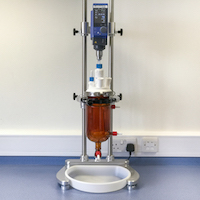 As a respected supplier of off-the-shelf laboratory reactor systems, Asynt has the in-depth knowledge and glassware manufacturing expertise to also offer customised glass reactor vessels ranging from tens of millilitres to 50 litres in capacity. A polymer resin manufacturer commissioned Asynt to develop a 20-litre jacketed glass laboratory reactor...
As a respected supplier of off-the-shelf laboratory reactor systems, Asynt has the in-depth knowledge and glassware manufacturing expertise to also offer customised glass reactor vessels ranging from tens of millilitres to 50 litres in capacity. A polymer resin manufacturer commissioned Asynt to develop a 20-litre jacketed glass laboratory reactor...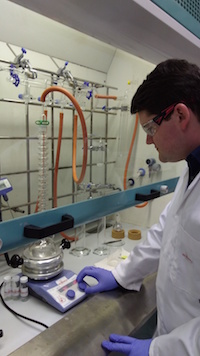 Owned by an expandable group of leading UK universities, Redbrick Molecular has unparalleled access to intellectual property generated by these partners allowing them to produce novel strategic building blocks and organic fragments that are attractive to industrial medicinal chemists....
Owned by an expandable group of leading UK universities, Redbrick Molecular has unparalleled access to intellectual property generated by these partners allowing them to produce novel strategic building blocks and organic fragments that are attractive to industrial medicinal chemists....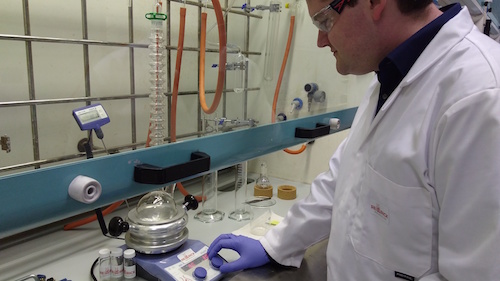 Owned by an expandable group of leading UK universities, Redbrick Molecular has unparalleled access to intellectual property generated by these partners allowing them to produce novel strategic building blocks and organic fragments that are attractive to industrial medicinal chemists.....
Owned by an expandable group of leading UK universities, Redbrick Molecular has unparalleled access to intellectual property generated by these partners allowing them to produce novel strategic building blocks and organic fragments that are attractive to industrial medicinal chemists.....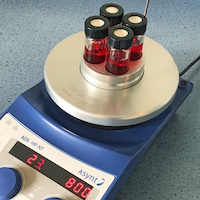 The DrySyn UNO uses DrySyn MULTI inserts to convert any standard hotplate stirrer into a reaction block platform for a single flask from 500ml down to 5ml. In addition, it also allows you to use DrySyn Reaction Vial inserts to undertake securely held heated / stirred experiments....
The DrySyn UNO uses DrySyn MULTI inserts to convert any standard hotplate stirrer into a reaction block platform for a single flask from 500ml down to 5ml. In addition, it also allows you to use DrySyn Reaction Vial inserts to undertake securely held heated / stirred experiments....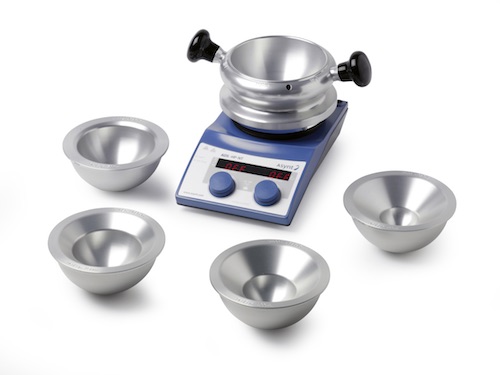 The DrySyn Classic Starter Kit gives you a great opportunity to try the outstanding performance of this popular laboratory heating block which is compatible with the most commonly used round bottomed flask sizes (50, 100, 250, 500 and 1000ml)....
The DrySyn Classic Starter Kit gives you a great opportunity to try the outstanding performance of this popular laboratory heating block which is compatible with the most commonly used round bottomed flask sizes (50, 100, 250, 500 and 1000ml)....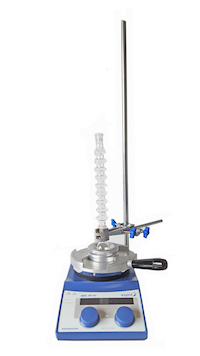 Scientists worldwide are increasingly concerned about the safety, cost and indeed the environmental impact of running their laboratories. For synthetic experiments a reflux condenser is often required and is therefore an essential tool for both research and teaching chemistry....
Scientists worldwide are increasingly concerned about the safety, cost and indeed the environmental impact of running their laboratories. For synthetic experiments a reflux condenser is often required and is therefore an essential tool for both research and teaching chemistry....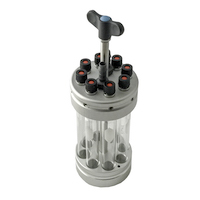 The compact DrySyn Octo parallel synthesizer accommodates low cost consumable reaction tubes each with a working volume of 5-6 ml. The large surface area of these glass reaction tubes enables the DrySyn Octo to be used for air cooled gentle reflux reactions....
The compact DrySyn Octo parallel synthesizer accommodates low cost consumable reaction tubes each with a working volume of 5-6 ml. The large surface area of these glass reaction tubes enables the DrySyn Octo to be used for air cooled gentle reflux reactions.... QuantuMDx purchased the cabinets to aid the development of their portable diagnostic device Q-POC, which will provide sample-to-result diagnostic and drug susceptibility testing for a range of diseases in under 20 minutes by the patient’s side. The device is due for commercialisation in 2018....
QuantuMDx purchased the cabinets to aid the development of their portable diagnostic device Q-POC, which will provide sample-to-result diagnostic and drug susceptibility testing for a range of diseases in under 20 minutes by the patient’s side. The device is due for commercialisation in 2018....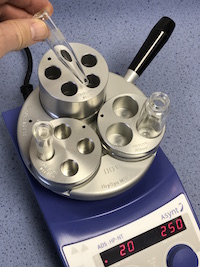 Available as an option for the DrySyn Parallel Synthesis Kit the new microwave vial inserts allow you to heat and stir up to 27 small scale reactions in parallel using any standard hotplate. The DrySyn Parallel Synthesis kit enables clean, safe synthesis without the hazards or problems associated with silicon oil baths or heating mantles....
Available as an option for the DrySyn Parallel Synthesis Kit the new microwave vial inserts allow you to heat and stir up to 27 small scale reactions in parallel using any standard hotplate. The DrySyn Parallel Synthesis kit enables clean, safe synthesis without the hazards or problems associated with silicon oil baths or heating mantles....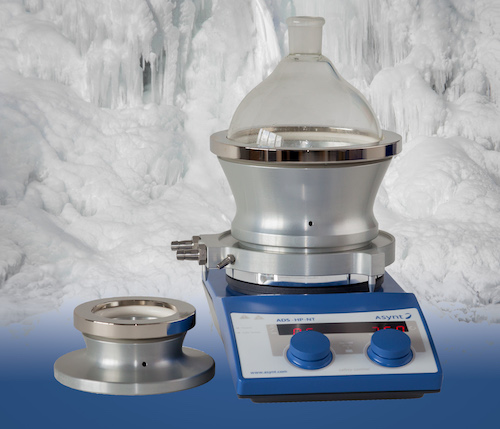 The affordably priced DrySyn® SnowStorm ONE accommodates single standard round-bottomed reaction flasks from 50ml to 1000ml. Interchange of reaction flasks is easy and takes just seconds without disrupting the circulation fluid as is required when using expensive jacketed reaction vessels....
The affordably priced DrySyn® SnowStorm ONE accommodates single standard round-bottomed reaction flasks from 50ml to 1000ml. Interchange of reaction flasks is easy and takes just seconds without disrupting the circulation fluid as is required when using expensive jacketed reaction vessels....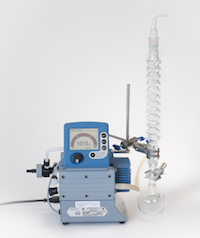 Rotary evaporators typically have an integral water or dry ice condenser which, when combined with a well-controlled automatic vacuum pump, provides an effective trap for most solvent vapours. However some solvent will always escape the condenser trap and make its way into the exhaust of the vacuum pump and out into your laboratory environment....
Rotary evaporators typically have an integral water or dry ice condenser which, when combined with a well-controlled automatic vacuum pump, provides an effective trap for most solvent vapours. However some solvent will always escape the condenser trap and make its way into the exhaust of the vacuum pump and out into your laboratory environment....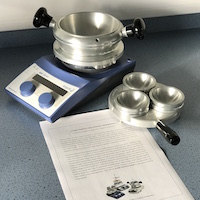 Written in conjunction with the Department of Chemistry, University of St Andrews (UK) and Advanced Chemical Safety Inc. (USA) the illustrated guide leads you through best practices for glassware inspection, setting up your reaction, heating your reaction and the post-reaction cool down phase.....
Written in conjunction with the Department of Chemistry, University of St Andrews (UK) and Advanced Chemical Safety Inc. (USA) the illustrated guide leads you through best practices for glassware inspection, setting up your reaction, heating your reaction and the post-reaction cool down phase.....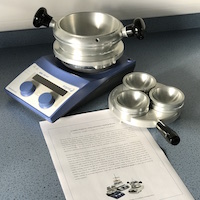 Written in conjunction with the Department of Chemistry, University of St Andrews (UK) and Advanced Chemical Safety Inc. (USA) the illustrated guide leads you through best practices for glassware inspection, setting up your reaction, heating your reaction and the post-reaction cool down phase....
Written in conjunction with the Department of Chemistry, University of St Andrews (UK) and Advanced Chemical Safety Inc. (USA) the illustrated guide leads you through best practices for glassware inspection, setting up your reaction, heating your reaction and the post-reaction cool down phase....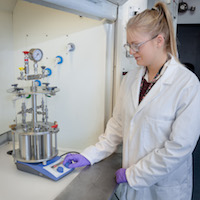 Used in conjunction with a hotplate stirrer the standard 316 stainless steel MultiCell reactor offers users the ability to undertake 10 x 30 ml reactions in parallel at pressures of up to 50 bar and temperatures up to 200°C. In response to customer requests - Asynt has developed a range of new features and options for the MultiCell high pressure parallel reactor that further increases the versatility of this high performance system....
Used in conjunction with a hotplate stirrer the standard 316 stainless steel MultiCell reactor offers users the ability to undertake 10 x 30 ml reactions in parallel at pressures of up to 50 bar and temperatures up to 200°C. In response to customer requests - Asynt has developed a range of new features and options for the MultiCell high pressure parallel reactor that further increases the versatility of this high performance system....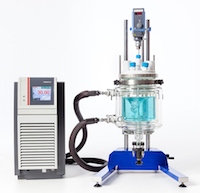 Data is presented for vacuum jacketed and non-vacuum jacketed reaction vessels connected to a Julabo Presto A30 temperature control system. The report demonstrates that a vacuum jacketed vessel not only achieved faster rates of cooling but was also able to maintain a reaction at -20°C compared to just -15°C for the non-vacuum jacketed vessel. Beneficially, also using a vacuum jacketed vessel was shown to eliminate ice formation on the outside of the...
Data is presented for vacuum jacketed and non-vacuum jacketed reaction vessels connected to a Julabo Presto A30 temperature control system. The report demonstrates that a vacuum jacketed vessel not only achieved faster rates of cooling but was also able to maintain a reaction at -20°C compared to just -15°C for the non-vacuum jacketed vessel. Beneficially, also using a vacuum jacketed vessel was shown to eliminate ice formation on the outside of the...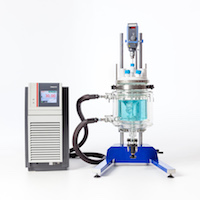 Data is presented for vacuum jacketed and non-vacuum jacketed reaction vessels connected to a Julabo Presto A30 temperature control system. The report demonstrates that a vacuum jacketed vessel not only achieved faster rates of cooling but was also able to maintain a reaction at -20°C compared to just -15°C for the non-vacuum jacketed vessel....
Data is presented for vacuum jacketed and non-vacuum jacketed reaction vessels connected to a Julabo Presto A30 temperature control system. The report demonstrates that a vacuum jacketed vessel not only achieved faster rates of cooling but was also able to maintain a reaction at -20°C compared to just -15°C for the non-vacuum jacketed vessel....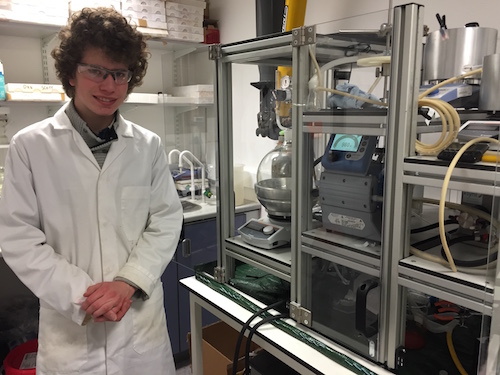 In an ideal flow crystallizer, nucleation and growth occur at the same location and rate for a given set of parameters. Particles are well suspended with good mixing throughout the reactor, while plug flow is achieved. However until recently traditional flow crystallizers have been either designed for large volumes or for very small volumes in microreactors with a narrow internal diameter....
In an ideal flow crystallizer, nucleation and growth occur at the same location and rate for a given set of parameters. Particles are well suspended with good mixing throughout the reactor, while plug flow is achieved. However until recently traditional flow crystallizers have been either designed for large volumes or for very small volumes in microreactors with a narrow internal diameter....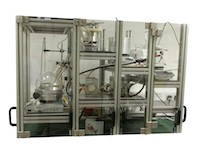 In an ideal flow crystallizer, nucleation and growth occur at the same location and rate for a given set of parameters. Particles are well suspended with good mixing throughout the reactor, while plug flow is achieved. However until recently traditional flow crystallizers have been either designed for large volumes or for very small volumes in microreactors with a narrow internal diameter, which makes them incompatible with any...
In an ideal flow crystallizer, nucleation and growth occur at the same location and rate for a given set of parameters. Particles are well suspended with good mixing throughout the reactor, while plug flow is achieved. However until recently traditional flow crystallizers have been either designed for large volumes or for very small volumes in microreactors with a narrow internal diameter, which makes them incompatible with any... Synthesis labs are aware that water-driven condensers use a large amount of water which is wasteful / expensive and offer the possibility of leaks from the condenser which can result in flooding thus are keen to find an alternative. In the two independent reports the Asynt CondenSyn air condenser displayed comparable performance to even the most efficient water-driven condensers and outperformed...
Synthesis labs are aware that water-driven condensers use a large amount of water which is wasteful / expensive and offer the possibility of leaks from the condenser which can result in flooding thus are keen to find an alternative. In the two independent reports the Asynt CondenSyn air condenser displayed comparable performance to even the most efficient water-driven condensers and outperformed...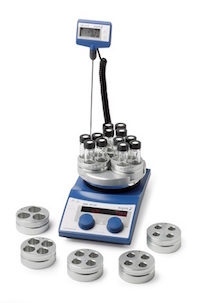 The new multi position blocks when combined with a DrySyn base unit allow up to 27 experiments to be performed in parallel. DrySyn heating blocks enable clean, safe synthesis without the hazards or problems associated with silicon oil baths or heating mantles. With no messy oil, heat resistant handles, and the most comprehensive range of simple-to-configure reaction inserts (for round bottom flasks, pear shaped flasks, boiling tubes, NMR tubes and vials) - DrySyn is the...
The new multi position blocks when combined with a DrySyn base unit allow up to 27 experiments to be performed in parallel. DrySyn heating blocks enable clean, safe synthesis without the hazards or problems associated with silicon oil baths or heating mantles. With no messy oil, heat resistant handles, and the most comprehensive range of simple-to-configure reaction inserts (for round bottom flasks, pear shaped flasks, boiling tubes, NMR tubes and vials) - DrySyn is the...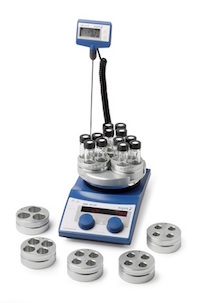 The new multi position blocks when combined with a DrySyn base unit allow up to 27 experiments to be performed in parallel. DrySyn heating blocks enable clean, safe synthesis without the hazards or problems associated with silicon oil baths or heating mantles. With no messy oil, heat resistant handles, and the most comprehensive range of simple-to-configure reaction inserts (for round bottom flasks, pear shaped flasks, boiling tubes, NMR tubes and vials) - DrySyn is...
The new multi position blocks when combined with a DrySyn base unit allow up to 27 experiments to be performed in parallel. DrySyn heating blocks enable clean, safe synthesis without the hazards or problems associated with silicon oil baths or heating mantles. With no messy oil, heat resistant handles, and the most comprehensive range of simple-to-configure reaction inserts (for round bottom flasks, pear shaped flasks, boiling tubes, NMR tubes and vials) - DrySyn is...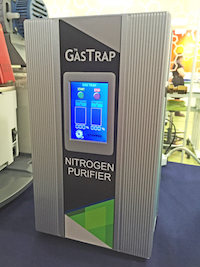 Gas purity is essential in any GC, HPLC or GC/MS application requiring high sensitivity. Available in optimised models for Helium, Hydrogen, Nitrogen and pure air - GasTrap gas purifiers dramatically reduce the levels of contaminants, enhance the purity of lower grade helium, and help ensure instrument stability, reproducibility as well as lowering running costs. Laboratory gases for GC, HPLC and GC/MS are typically supplied in pressurised cylinders that...
Gas purity is essential in any GC, HPLC or GC/MS application requiring high sensitivity. Available in optimised models for Helium, Hydrogen, Nitrogen and pure air - GasTrap gas purifiers dramatically reduce the levels of contaminants, enhance the purity of lower grade helium, and help ensure instrument stability, reproducibility as well as lowering running costs. Laboratory gases for GC, HPLC and GC/MS are typically supplied in pressurised cylinders that...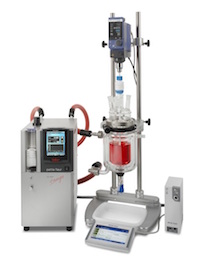 Compact in design, ReactoMate CLR systems offers the flexibility to accommodate reaction vessels from benchtop to pilot plant scale. Asynt is pleased to announce a new agreement with METTLER TOLEDO to integrate their market-leading RX-10 automation system with ReactoMate CLR systems (www.asynt.com/product-category/chemistry/controlled-lab-reactors/). The METTLER TOLEDO RX-10 automation system provides an interface connecting any...
Compact in design, ReactoMate CLR systems offers the flexibility to accommodate reaction vessels from benchtop to pilot plant scale. Asynt is pleased to announce a new agreement with METTLER TOLEDO to integrate their market-leading RX-10 automation system with ReactoMate CLR systems (www.asynt.com/product-category/chemistry/controlled-lab-reactors/). The METTLER TOLEDO RX-10 automation system provides an interface connecting any...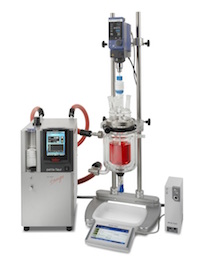 Compact in design, ReactoMate CLR systems offers the flexibility to accommodate reaction vessels from benchtop to pilot plant scale. Asynt is pleased to announce a new agreement with METTLER TOLEDO to integrate their market-leading RX-10 automation system with ReactoMate CLR systems. The METTLER TOLEDO RX-10 automation system provides an interface connecting any type and volume of ReactoMate CLR to circulating thermostats, stirrer motors...
Compact in design, ReactoMate CLR systems offers the flexibility to accommodate reaction vessels from benchtop to pilot plant scale. Asynt is pleased to announce a new agreement with METTLER TOLEDO to integrate their market-leading RX-10 automation system with ReactoMate CLR systems. The METTLER TOLEDO RX-10 automation system provides an interface connecting any type and volume of ReactoMate CLR to circulating thermostats, stirrer motors...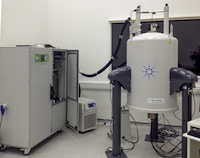 Traditionally, using liquid nitrogen (LN2) has required organisations to invest in expensive storage infrastructure and be reliant on tanker deliveries. The Asynt CryoSyn eliminates the need for storage and transportation of LN2 thereby making its use more convenient, reducing running costs and eliminating traditional evaporation / contamination problems. Generating nitrogen on demand the CryoSyn is the perfect device for...
Traditionally, using liquid nitrogen (LN2) has required organisations to invest in expensive storage infrastructure and be reliant on tanker deliveries. The Asynt CryoSyn eliminates the need for storage and transportation of LN2 thereby making its use more convenient, reducing running costs and eliminating traditional evaporation / contamination problems. Generating nitrogen on demand the CryoSyn is the perfect device for... Having implemented over 10 of these air condensers for use in inorganic and organic syntheses, as well as long term experimental systems, the Cronin Group were able to confirm that they now spend less set-up time and no longer have to worry over water leaking into electronic control and heating systems. In addition using CondenSyn air condensers has reduced clutter in heavily used fumehood spaces, as it eliminates the...
Having implemented over 10 of these air condensers for use in inorganic and organic syntheses, as well as long term experimental systems, the Cronin Group were able to confirm that they now spend less set-up time and no longer have to worry over water leaking into electronic control and heating systems. In addition using CondenSyn air condensers has reduced clutter in heavily used fumehood spaces, as it eliminates the...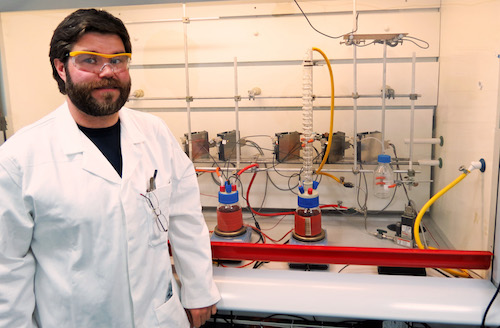 Having implemented over 10 of these air condensers for use in inorganic and organic syntheses, as well as long term experimental systems, the Cronin Group were able to confirm that they now spend less set-up time and no longer have to worry over water leaking into electronic control and heating systems. In addition using CondenSyn air condensers has reduced clutter in heavily used fumehood spaces, as it eliminates the...
Having implemented over 10 of these air condensers for use in inorganic and organic syntheses, as well as long term experimental systems, the Cronin Group were able to confirm that they now spend less set-up time and no longer have to worry over water leaking into electronic control and heating systems. In addition using CondenSyn air condensers has reduced clutter in heavily used fumehood spaces, as it eliminates the...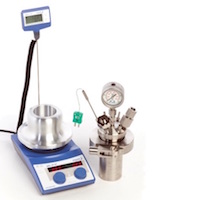 Rapid Powders Limited specialise in producing polymers with dispersions of functional materials such as metals, ceramics and carbons. Applications for these specialist materials include packaging, electrically conducting polymers, thermally conducting polymers and pigments. To enable them to rapidly make small batches of these functionalised polymers, Rapid Polymers Ltd evaluated various commercial small volume high pressure reactors for safety...
Rapid Powders Limited specialise in producing polymers with dispersions of functional materials such as metals, ceramics and carbons. Applications for these specialist materials include packaging, electrically conducting polymers, thermally conducting polymers and pigments. To enable them to rapidly make small batches of these functionalised polymers, Rapid Polymers Ltd evaluated various commercial small volume high pressure reactors for safety...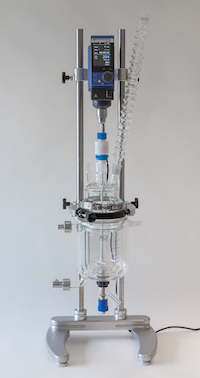 Reaction vessels from Asynt, and its partner AG!, can be easily exchanged on the ReactoMate "Datum" allowing chemists to quickly change between reactor vessel sizes thereby enabling simple synthesis scale-up. A novel mounting mechanism on the stylishly designed ReactoMate "Datum" ensures excellent stability and alignment every time. Designed to fit into a standard lab fumehood the ReactoMate "Datum" is simple to set-up, easy to use and reconfigure saving you valuable time and money...
Reaction vessels from Asynt, and its partner AG!, can be easily exchanged on the ReactoMate "Datum" allowing chemists to quickly change between reactor vessel sizes thereby enabling simple synthesis scale-up. A novel mounting mechanism on the stylishly designed ReactoMate "Datum" ensures excellent stability and alignment every time. Designed to fit into a standard lab fumehood the ReactoMate "Datum" is simple to set-up, easy to use and reconfigure saving you valuable time and money...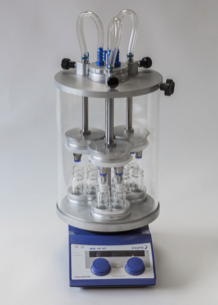 Many chemists in laboratories worldwide use DrySyn heating blocks to perform syntheses in parallel in flasks, tubes and vials. Combining this proven high performance labware with patented spiral plug evaporation technology from Biochromato - the DrySyn Spiral Evaporator offers fast and effective parallel evaporation in tubes without solvent bumping. The spiral air flow generated by this unique evaporation technology allows the DrySyn Spiral Evaporator to rapidly concentrate even high...
Many chemists in laboratories worldwide use DrySyn heating blocks to perform syntheses in parallel in flasks, tubes and vials. Combining this proven high performance labware with patented spiral plug evaporation technology from Biochromato - the DrySyn Spiral Evaporator offers fast and effective parallel evaporation in tubes without solvent bumping. The spiral air flow generated by this unique evaporation technology allows the DrySyn Spiral Evaporator to rapidly concentrate even high...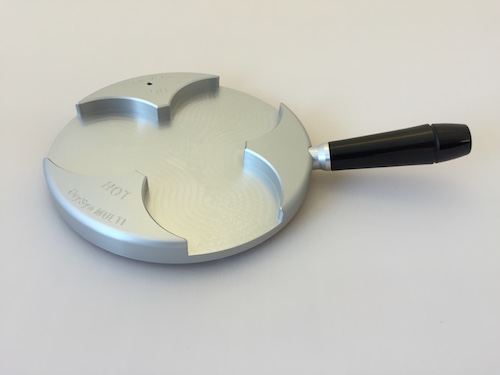 Available until recently as an removable option on DrySyn MULTI, MULTI-M and MULTI-S kits, positive customer feedback as to the considerable safety benefits of using them when lifting hot heating blocks / reaction vessels has spurred Asynt to make them a permanently attached standard feature. DrySyn single position heating blocks have always included permanently attached heat resistant safety handles. Martyn Fordham...
Available until recently as an removable option on DrySyn MULTI, MULTI-M and MULTI-S kits, positive customer feedback as to the considerable safety benefits of using them when lifting hot heating blocks / reaction vessels has spurred Asynt to make them a permanently attached standard feature. DrySyn single position heating blocks have always included permanently attached heat resistant safety handles. Martyn Fordham...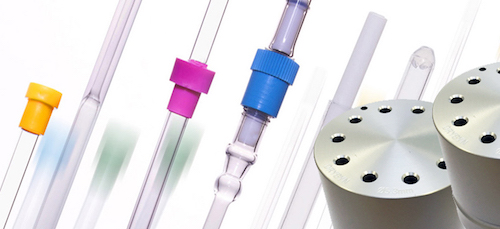 This new DrySyn unit allows you to use standard NMR tubes as a reaction vessel for applications including catalyst screening experiments and reaction monitoring as well as studying broad peaks, temperature dependent solubility issues and conformational changes. Unlike heating in problematic oil baths, using a DrySyn NMR Heating Blocks allows you to analyse the contents of your NMR tube almost immediately without removal...
This new DrySyn unit allows you to use standard NMR tubes as a reaction vessel for applications including catalyst screening experiments and reaction monitoring as well as studying broad peaks, temperature dependent solubility issues and conformational changes. Unlike heating in problematic oil baths, using a DrySyn NMR Heating Blocks allows you to analyse the contents of your NMR tube almost immediately without removal...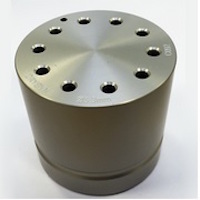 This new DrySyn unit allows you to use standard NMR tubes as a reaction vessel for applications including catalyst screening experiments and reaction monitoring as well as studying broad peaks, temperature dependent solubility issues and conformational changes. Unlike heating in problematic oil baths, using a DrySyn NMR Heating Blocks allows you to analyse the contents of your NMR tube almost immediately without removal of residual oil on the outside...
This new DrySyn unit allows you to use standard NMR tubes as a reaction vessel for applications including catalyst screening experiments and reaction monitoring as well as studying broad peaks, temperature dependent solubility issues and conformational changes. Unlike heating in problematic oil baths, using a DrySyn NMR Heating Blocks allows you to analyse the contents of your NMR tube almost immediately without removal of residual oil on the outside...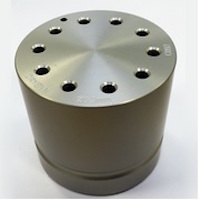 This new DrySyn unit allows you to use standard NMR tubes as a reaction vessel for applications including catalyst screening experiments and reaction monitoring as well as studying broad peaks, temperature dependent solubility issues and conformational changes. Unlike heating in problematic oil baths, using a DrySyn NMR Heating Blocks allows you to analyse the contents of your NMR tube almost immediately without removal of residual oil on the outside of the glassware...
This new DrySyn unit allows you to use standard NMR tubes as a reaction vessel for applications including catalyst screening experiments and reaction monitoring as well as studying broad peaks, temperature dependent solubility issues and conformational changes. Unlike heating in problematic oil baths, using a DrySyn NMR Heating Blocks allows you to analyse the contents of your NMR tube almost immediately without removal of residual oil on the outside of the glassware...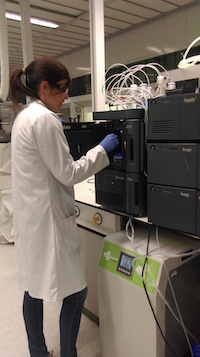 Reach Separations specialises in chiral chromatography for the analysis and purification of small molecules. Using state-of-the-art HPLC and SFC instrumentation, Reach Separations offer screening, method development and purification for chiral and achiral molecules across the pharmaceutical, agrochemical and fine chemical sectors. To further enhance the speed and efficiency of their contract research service, Reach Separations recently invested in an Asynt nitrogen generator to replace their use of...
Reach Separations specialises in chiral chromatography for the analysis and purification of small molecules. Using state-of-the-art HPLC and SFC instrumentation, Reach Separations offer screening, method development and purification for chiral and achiral molecules across the pharmaceutical, agrochemical and fine chemical sectors. To further enhance the speed and efficiency of their contract research service, Reach Separations recently invested in an Asynt nitrogen generator to replace their use of...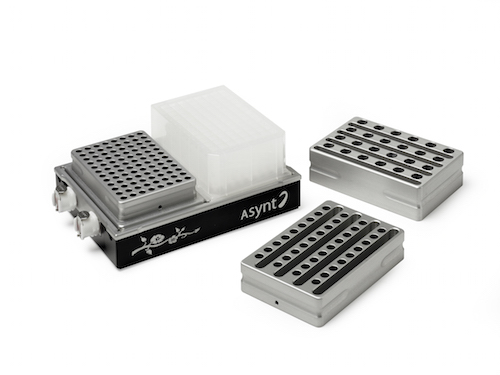 Traditionally methods of cooling biological samples often rely upon direct immersion in ice buckets which are prone to considerable temperature variability, contamination and loss of wetted labels. ChilliBlocks can be used directly in conjunction with an ice bath keeping your samples in microplates, vials and Eppendorf tubes cool and dry. For precise temperature controlled experiments – ChilliBlocks should be used with our cooling/heating base unit...
Traditionally methods of cooling biological samples often rely upon direct immersion in ice buckets which are prone to considerable temperature variability, contamination and loss of wetted labels. ChilliBlocks can be used directly in conjunction with an ice bath keeping your samples in microplates, vials and Eppendorf tubes cool and dry. For precise temperature controlled experiments – ChilliBlocks should be used with our cooling/heating base unit...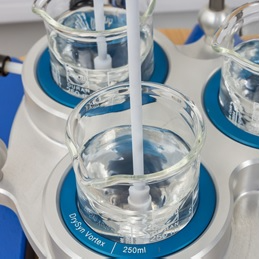 Stirring tasks are most often performed in laboratories using magnetic hotplate stirrers which couple to PTFE magnetic stirring bars in the reaction vessel. Disadvantages of magnetic stirrers include that they are not suitable for highly viscous liquids or for stirring / blending reactions that have high amounts of solid which can often prove too much for the magnetic coupling. The DrySyn Vortex system was designed to enable scientists to perform multiple heated or cooled...
Stirring tasks are most often performed in laboratories using magnetic hotplate stirrers which couple to PTFE magnetic stirring bars in the reaction vessel. Disadvantages of magnetic stirrers include that they are not suitable for highly viscous liquids or for stirring / blending reactions that have high amounts of solid which can often prove too much for the magnetic coupling. The DrySyn Vortex system was designed to enable scientists to perform multiple heated or cooled...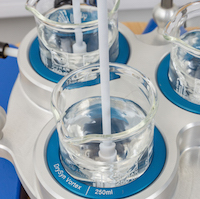 Stirring tasks are most often performed in laboratories using magnetic hotplate stirrers which couple to PTFE magnetic stirring bars in the reaction vessel. Disadvantages of magnetic stirrers include that they are not suitable for highly viscous liquids or for stirring / blending reactions that have high amounts of solid which can often prove too much for the magnetic coupling. The DrySyn Vortex system was designed to enable scientists to perform multiple heated or...
Stirring tasks are most often performed in laboratories using magnetic hotplate stirrers which couple to PTFE magnetic stirring bars in the reaction vessel. Disadvantages of magnetic stirrers include that they are not suitable for highly viscous liquids or for stirring / blending reactions that have high amounts of solid which can often prove too much for the magnetic coupling. The DrySyn Vortex system was designed to enable scientists to perform multiple heated or...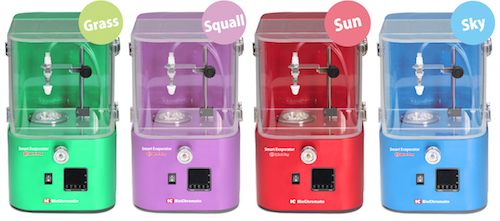 The spiral air flow generated by this unique concentration technology allows the Smart Evaporator to rapidly concentrate even high boiling solvents, such as DMSO, DMF and water without heating to high temperatures. The Spiral Plug concentration technology works by using vacuum to draw air /nitrogen through a spiral slit generating a vortex which both stirs the sample and creates an increased evaporative surface area. This unique technology...
The spiral air flow generated by this unique concentration technology allows the Smart Evaporator to rapidly concentrate even high boiling solvents, such as DMSO, DMF and water without heating to high temperatures. The Spiral Plug concentration technology works by using vacuum to draw air /nitrogen through a spiral slit generating a vortex which both stirs the sample and creates an increased evaporative surface area. This unique technology...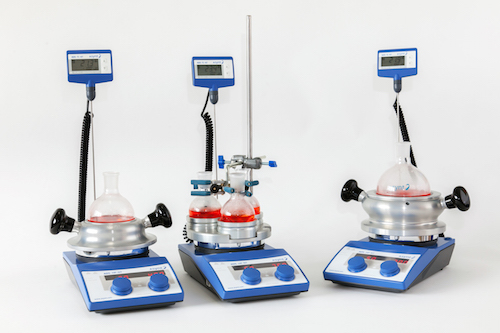 First introduced over 11 years ago and continuously improved since, many scientists worldwide have come to rely on its unique design and safety features for their chemistry experiments. The DrySyn Classic was the first model introduced by Asynt to the chemistry community. Today the DrySyn range additionally includes Scholar, Multi, Maxi and Snowstorm models for heated and cooled reactions. New engineering techniques have enabled Asynt to...
First introduced over 11 years ago and continuously improved since, many scientists worldwide have come to rely on its unique design and safety features for their chemistry experiments. The DrySyn Classic was the first model introduced by Asynt to the chemistry community. Today the DrySyn range additionally includes Scholar, Multi, Maxi and Snowstorm models for heated and cooled reactions. New engineering techniques have enabled Asynt to...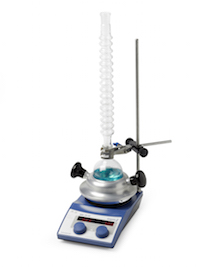 Drawing upon over 30 years of scientific glass manufacturing knowledge, Asynt has created an affordable high-surface-area air condenser which is both safe and operationally effective. The robust design uses a new borosilicate glass manufacturing technique and this, together with a proprietary multiple hyperbolic profile, ensures optimum heat removal as vapours pass along its length. CondenSyn additionally incorporates a non-roll feature to help prevent accidents if left on a...
Drawing upon over 30 years of scientific glass manufacturing knowledge, Asynt has created an affordable high-surface-area air condenser which is both safe and operationally effective. The robust design uses a new borosilicate glass manufacturing technique and this, together with a proprietary multiple hyperbolic profile, ensures optimum heat removal as vapours pass along its length. CondenSyn additionally incorporates a non-roll feature to help prevent accidents if left on a...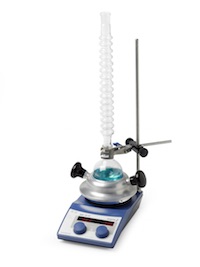 Organisations are growing increasingly concerned about both the environmental impact and indeed the cost of running a research facility. A condenser is often required for synthetic experiments and therefore an essential tool for the research chemist. Whilst condensers cooled by a circulating fluid such as water are effective, their constant need for running tap water creates an environmental and cost issue. Consequently such condensers should ideally be attached to a recirculating chiller...
Organisations are growing increasingly concerned about both the environmental impact and indeed the cost of running a research facility. A condenser is often required for synthetic experiments and therefore an essential tool for the research chemist. Whilst condensers cooled by a circulating fluid such as water are effective, their constant need for running tap water creates an environmental and cost issue. Consequently such condensers should ideally be attached to a recirculating chiller...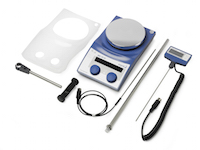 Manufactured in an ISO9001-2008 production facility, each Asynt hotplate stirrer incorporates two independent control circuits. The additional and independent safety circuit is for limiting the maximum heating plate temperature; this can be adjusted between 50 and 360 ºC but cannot be changed accidentally. This ensures that the flashpoint of your reaction solvent is not exceeded making it ideal for teaching laboratories...
Manufactured in an ISO9001-2008 production facility, each Asynt hotplate stirrer incorporates two independent control circuits. The additional and independent safety circuit is for limiting the maximum heating plate temperature; this can be adjusted between 50 and 360 ºC but cannot be changed accidentally. This ensures that the flashpoint of your reaction solvent is not exceeded making it ideal for teaching laboratories...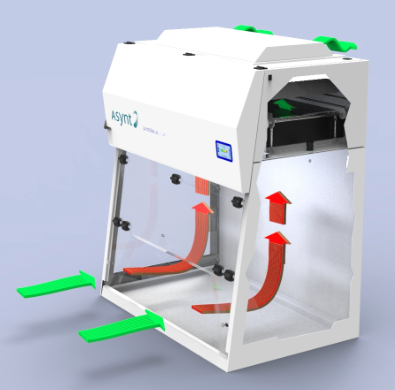 Available in standard widths from 550mm to 900mm wide, all Asynt fume cupboards are fully compliant with COSHH regulations and international standards including BS7989:2001 for filtration fume / particulate cupboards. During manufacture, every aspect of the cabinet, from the electrics to the metalwork, is meticulously checked and monitored to ensure high reliability, optimal operation and safety is achieved. All Asynt fume cupboards employ...
Available in standard widths from 550mm to 900mm wide, all Asynt fume cupboards are fully compliant with COSHH regulations and international standards including BS7989:2001 for filtration fume / particulate cupboards. During manufacture, every aspect of the cabinet, from the electrics to the metalwork, is meticulously checked and monitored to ensure high reliability, optimal operation and safety is achieved. All Asynt fume cupboards employ...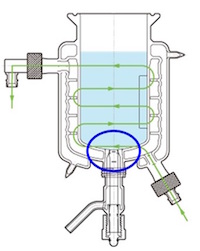 Having visited the AG! production facility in Japan - Asynt Managing Director (Martyn Fordham commented “I was greatly impressed by the AG! glassblowing capabilities which is technically beyond what I have witnessed anywhere in the last 30 years”. He added “At Asynt our aim is always to offer the highest specification and best performing products, so consequently the AG! Glass reaction vessels fit perfectly in our portfolio. I believe that the wider chemistry community...
Having visited the AG! production facility in Japan - Asynt Managing Director (Martyn Fordham commented “I was greatly impressed by the AG! glassblowing capabilities which is technically beyond what I have witnessed anywhere in the last 30 years”. He added “At Asynt our aim is always to offer the highest specification and best performing products, so consequently the AG! Glass reaction vessels fit perfectly in our portfolio. I believe that the wider chemistry community...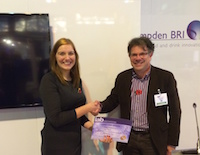 The company fought off competition from three other exhibitors all pitching their most innovative products to an expert panel in order to be voted best in show. The panel of Lions’ (judges) included Phillip Broadwith, Business Editor of Chemistry World, Kasia Wincoirek, Laboratory Manager at DNA Electronics, Phil Prime, Managing Editor at Laboratory News and Yahya Akudi, QC Lab Manager at Nuarfarm Ltd. Asynt won with its pioneering product, PressureSyn...
The company fought off competition from three other exhibitors all pitching their most innovative products to an expert panel in order to be voted best in show. The panel of Lions’ (judges) included Phillip Broadwith, Business Editor of Chemistry World, Kasia Wincoirek, Laboratory Manager at DNA Electronics, Phil Prime, Managing Editor at Laboratory News and Yahya Akudi, QC Lab Manager at Nuarfarm Ltd. Asynt won with its pioneering product, PressureSyn...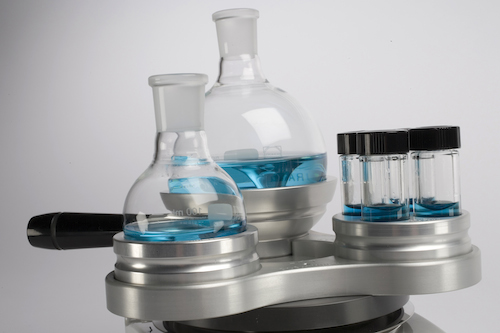 In order to improve safety in his laboratories, Leone Spiccia, Professor of Chemistry at Monash University sought laboratory apparatus to replace oil bath systems traditionally used for all general syntheses. He comments “After a lengthy evaluation process we decided to switch to DrySyn heating block systems as they are inherently safer to use than heated oil baths, avoiding the risk of oil spillage that can lead to burns when hot or may cause someone to slip over”. Professor Spiccia added “We are using DrySyn products inside our nanoimaging team...
In order to improve safety in his laboratories, Leone Spiccia, Professor of Chemistry at Monash University sought laboratory apparatus to replace oil bath systems traditionally used for all general syntheses. He comments “After a lengthy evaluation process we decided to switch to DrySyn heating block systems as they are inherently safer to use than heated oil baths, avoiding the risk of oil spillage that can lead to burns when hot or may cause someone to slip over”. Professor Spiccia added “We are using DrySyn products inside our nanoimaging team...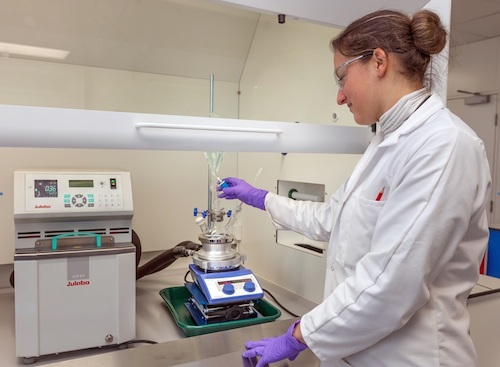 The Asynt DrySyn SnowStorm offers an attractive solution to laboratories undertaking low temperature reaction chemistries. Available in a choice of configurations, the DrySyn SnowStorm system provides controlled cooling and heating for sub-ambient parallel chemistry without the need for jacketed reaction vessels, or ice baths. Operating with a suitable chiller / circulator, a DrySyn SnowStorm system provides accurate, stable temperature control down to -50 °C and up to +150 °C....
The Asynt DrySyn SnowStorm offers an attractive solution to laboratories undertaking low temperature reaction chemistries. Available in a choice of configurations, the DrySyn SnowStorm system provides controlled cooling and heating for sub-ambient parallel chemistry without the need for jacketed reaction vessels, or ice baths. Operating with a suitable chiller / circulator, a DrySyn SnowStorm system provides accurate, stable temperature control down to -50 °C and up to +150 °C....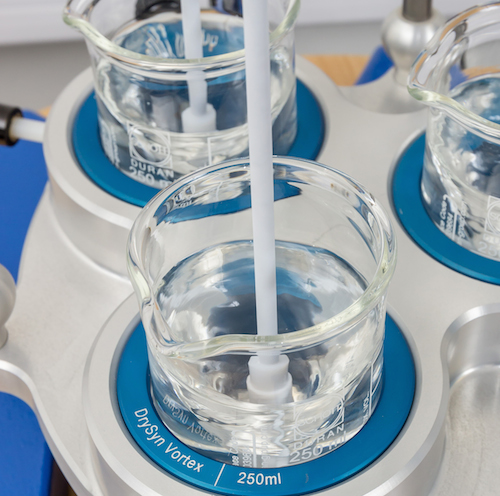 Many scientists in the oil, polymer, cosmetics and hygiene industries have established methods for blending and formulation development based upon mixing materials in standard laboratory beakers. These protocols often require heating and powerful mixing to ensure blend / formulation homogeneity. To accelerate formulation development it is advantageous to perform multiple blending experiments in parallel. Traditionally conducting multiple heating and overhead stirring experiments in parallel has taken up a lot of valuable fume hood space...
Many scientists in the oil, polymer, cosmetics and hygiene industries have established methods for blending and formulation development based upon mixing materials in standard laboratory beakers. These protocols often require heating and powerful mixing to ensure blend / formulation homogeneity. To accelerate formulation development it is advantageous to perform multiple blending experiments in parallel. Traditionally conducting multiple heating and overhead stirring experiments in parallel has taken up a lot of valuable fume hood space...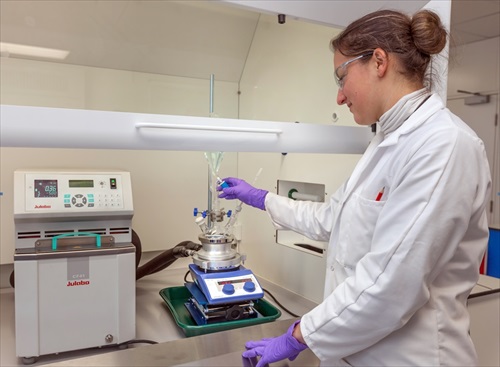 The Asynt DrySyn SnowStorm offers an attractive solution to laboratories undertaking low temperature reaction chemistries. Available in a choice of configurations, the DrySyn SnowStorm system provides controlled cooling and heating for sub-ambient parallel chemistry without the need for jacketed reaction vessels, or ice baths. Operating with a suitable chiller / circulator, a DrySyn SnowStorm system provides accurate, stable temperature control down to -50 °C and up to +150 °C...
The Asynt DrySyn SnowStorm offers an attractive solution to laboratories undertaking low temperature reaction chemistries. Available in a choice of configurations, the DrySyn SnowStorm system provides controlled cooling and heating for sub-ambient parallel chemistry without the need for jacketed reaction vessels, or ice baths. Operating with a suitable chiller / circulator, a DrySyn SnowStorm system provides accurate, stable temperature control down to -50 °C and up to +150 °C...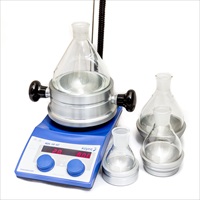
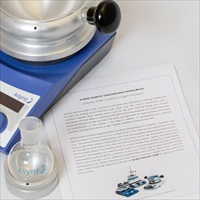
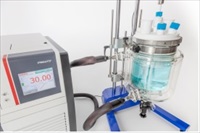
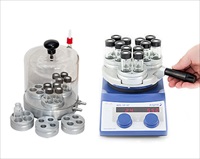
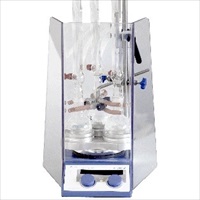
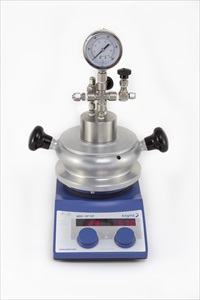 The base vessels are available from 50ml to 500ml and are rated up to 200 Barr and 200 degrees centigrade enabling reactions including hydrogenation, carbonylation and carboxylation at elevated temperatures and pressures to be routinely performed. With the added flexibility of standard and custom DrySyn inserts, Asynt gas pressure reactors provide chemists with a platform to undertake a single reaction from 100's of microlitres, by itself or in parallel, up to a single reaction to the volume of the vessel...
The base vessels are available from 50ml to 500ml and are rated up to 200 Barr and 200 degrees centigrade enabling reactions including hydrogenation, carbonylation and carboxylation at elevated temperatures and pressures to be routinely performed. With the added flexibility of standard and custom DrySyn inserts, Asynt gas pressure reactors provide chemists with a platform to undertake a single reaction from 100's of microlitres, by itself or in parallel, up to a single reaction to the volume of the vessel...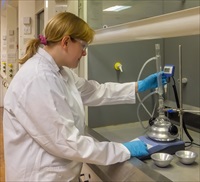 The School of Chemistry at the University of Nottingham is one of the leading Chemistry departments in the UK and is recognised internationally for its world leading research portfolio, excellence in teaching and extensive engagement with Industry. Its expertise spans the spectrum of modern chemical technology including synthesis, analysis and characterisation, ranging from the core chemistry disciplines to areas at the interface with biological sciences and engineering (sustainable chemical processing)......
The School of Chemistry at the University of Nottingham is one of the leading Chemistry departments in the UK and is recognised internationally for its world leading research portfolio, excellence in teaching and extensive engagement with Industry. Its expertise spans the spectrum of modern chemical technology including synthesis, analysis and characterisation, ranging from the core chemistry disciplines to areas at the interface with biological sciences and engineering (sustainable chemical processing)......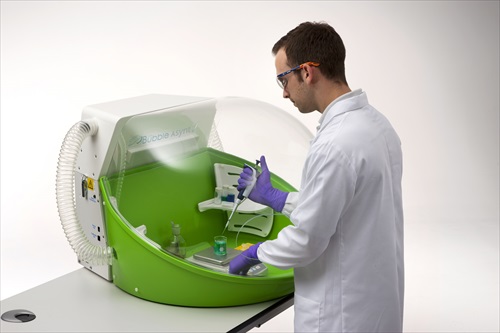 The Lab-Bubble™ is designed and tested in various configurations for applications including handling of chemicals and powders, weighing, biological sample handling and PCR preparation. The environment in the Lab-Bubble™ can be controlled for humidity (20-55% RH) using a dry Nitrogen glove box and temperature (15-30°C). The air extraction on Lab-Bubble™ is provided via a small box section fan filtration system that incorporates a safe change HEPA / carbon combination filter...
The Lab-Bubble™ is designed and tested in various configurations for applications including handling of chemicals and powders, weighing, biological sample handling and PCR preparation. The environment in the Lab-Bubble™ can be controlled for humidity (20-55% RH) using a dry Nitrogen glove box and temperature (15-30°C). The air extraction on Lab-Bubble™ is provided via a small box section fan filtration system that incorporates a safe change HEPA / carbon combination filter...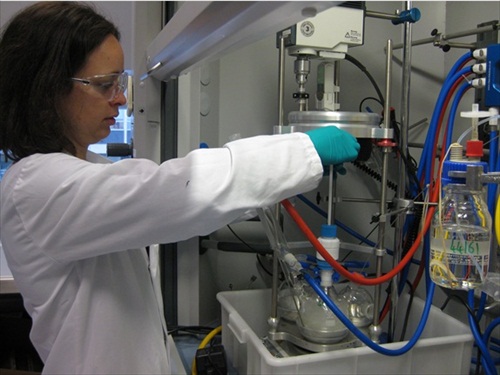
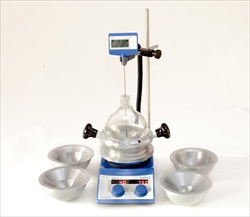 Recent design improvements in this popular product have resulted in improved heat transfer characteristics up to 300ºC, faster heating and cooling, and a smaller footprint. Used in combination with a standard hotplate stirrer, DrySyn Classic units have proved themselves with their ability to outperform the heat-conducting properties of oil baths...
Recent design improvements in this popular product have resulted in improved heat transfer characteristics up to 300ºC, faster heating and cooling, and a smaller footprint. Used in combination with a standard hotplate stirrer, DrySyn Classic units have proved themselves with their ability to outperform the heat-conducting properties of oil baths...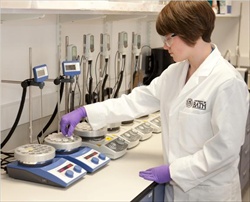 The adapted DrySyn system, designed by Asynt in conjunction with the University of Bath, is being used to help simplify and accelerate development of crystallisation methodology to selectively control polymorph formation, and to generate multi-component crystals with favourable target physical properties such as optical effects, solubility and porosity...
The adapted DrySyn system, designed by Asynt in conjunction with the University of Bath, is being used to help simplify and accelerate development of crystallisation methodology to selectively control polymorph formation, and to generate multi-component crystals with favourable target physical properties such as optical effects, solubility and porosity...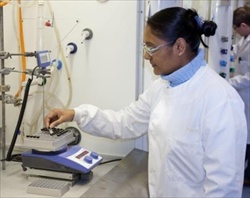 Asynt has supplied a leading European Contract Research Organisation (CRO) with a custom heating block system to assist chemists analysing the thermal stability of multiple samples being prepared for its commercial compound libraries. Traditionally the CRO had used an offline heating source to heat samples coming from its UPLC system - the process was highly labour intensive, involving manual transfer of samples to and from the UPLC autosampler...
Asynt has supplied a leading European Contract Research Organisation (CRO) with a custom heating block system to assist chemists analysing the thermal stability of multiple samples being prepared for its commercial compound libraries. Traditionally the CRO had used an offline heating source to heat samples coming from its UPLC system - the process was highly labour intensive, involving manual transfer of samples to and from the UPLC autosampler...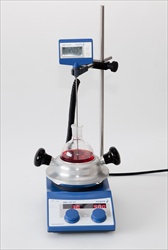 Developed in response to widespread demand - Asynt has introduced a new version of its popular DrySyn heating block system for teaching and academic research laboratories. The DrySyn Scholar brings together robustness, low cost, enhanced operator safety features and ease of use - making it the ultimate 'student proof' heating block system...
Developed in response to widespread demand - Asynt has introduced a new version of its popular DrySyn heating block system for teaching and academic research laboratories. The DrySyn Scholar brings together robustness, low cost, enhanced operator safety features and ease of use - making it the ultimate 'student proof' heating block system...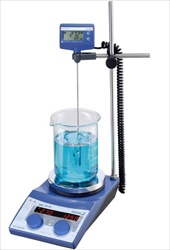 With a strong emphasis on safety the newly designed Asynt hotplate stirrer incorporates two independent control circuits, so that the set temperature values are held constant in the event of one circuit malfunctioning. According to Dr Kerry Elgie, at Asynt, 'The expanded range of safety features makes this hotplate stirrer eminently suitable for unsupervised operation in the chemistry lab. The safety circuit for the heating plate temperature can be adjusted between 50 and 360 ºC, but cannot be changed accidentally. This ensures that the flashpoint of the medium is not exceeded. A 'Hot Top' warning indicator to prevent burns and easy-to-read digital displays with error code warnings are also included."...
With a strong emphasis on safety the newly designed Asynt hotplate stirrer incorporates two independent control circuits, so that the set temperature values are held constant in the event of one circuit malfunctioning. According to Dr Kerry Elgie, at Asynt, 'The expanded range of safety features makes this hotplate stirrer eminently suitable for unsupervised operation in the chemistry lab. The safety circuit for the heating plate temperature can be adjusted between 50 and 360 ºC, but cannot be changed accidentally. This ensures that the flashpoint of the medium is not exceeded. A 'Hot Top' warning indicator to prevent burns and easy-to-read digital displays with error code warnings are also included."... Asynt's versatile and cost-effective DrySyn heating blocks have been selected to equip an important new medicinal chemistry laboratory for the Northern Institute for Cancer Research (NICR) at Newcastle University...
Asynt's versatile and cost-effective DrySyn heating blocks have been selected to equip an important new medicinal chemistry laboratory for the Northern Institute for Cancer Research (NICR) at Newcastle University...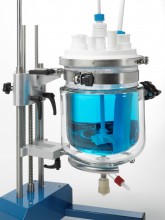 The ReactoMate Compact from Asynt is a small, safe and super-stable laboratory reaction system. Complementing the ReactoMate Standard and Super Support systems, the new Compact model accommodates jacketed reactors from 50 ml to 5,000 ml and delivers precise control of reaction variables to mimic conditions in much larger plant vessels...
The ReactoMate Compact from Asynt is a small, safe and super-stable laboratory reaction system. Complementing the ReactoMate Standard and Super Support systems, the new Compact model accommodates jacketed reactors from 50 ml to 5,000 ml and delivers precise control of reaction variables to mimic conditions in much larger plant vessels...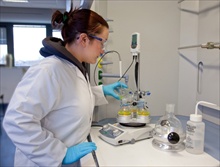 Two chemistry teaching laboratories and a research laboratory at Nottingham Trent University have been completely re-equipped with Asynt DrySyn® heating blocks, providing a cleaner, safer and more convenient alternative to the oil baths previously in use...
Two chemistry teaching laboratories and a research laboratory at Nottingham Trent University have been completely re-equipped with Asynt DrySyn® heating blocks, providing a cleaner, safer and more convenient alternative to the oil baths previously in use...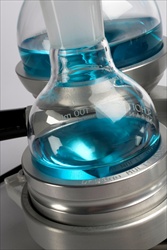 The DrySyn MULTI-M from Asynt converts any standard hotplate stirrer into a reaction block for three flasks or up to 12 vials. Providing excellent heating and stirring performance but without the high risk of fire and toxic fumes from an oil bath, DrySyn heating blocks help laboratories create a safer, cleaner and more efficient working environment.
The DrySyn MULTI-M from Asynt converts any standard hotplate stirrer into a reaction block for three flasks or up to 12 vials. Providing excellent heating and stirring performance but without the high risk of fire and toxic fumes from an oil bath, DrySyn heating blocks help laboratories create a safer, cleaner and more efficient working environment.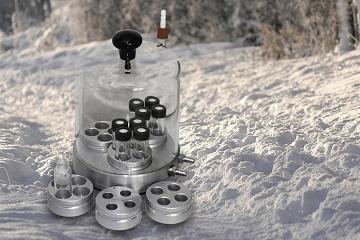 DrySyn SnowStorm, Asynt's cost-effective solution for low temperature reaction chemistry, offers active temperature control without ice formation and the ability to cool and stir up to 12 reaction tubes in parallel. The new DrySyn SnowStorm is ideal for a wide range of applications in chemistry, process development and biology.
DrySyn SnowStorm, Asynt's cost-effective solution for low temperature reaction chemistry, offers active temperature control without ice formation and the ability to cool and stir up to 12 reaction tubes in parallel. The new DrySyn SnowStorm is ideal for a wide range of applications in chemistry, process development and biology.